031 Sentence Structure + Phrases, Clause
Cliffs toefl এর বাংলা ভার্সন নোট। – link
—-
Normal Sentence Structure: Sub(৬) + Finite Verb + Extention(৩)
Subject
Subject: English এ ৬টা টপিক Subject হতে পারে। –
- noun
- pronoun
- infinitive, infinitive phrase
- Gerund phrase
- verbal noun
- noun clause
শেষের ৪টা Subject হলে verbটি singular হয়।
# infinitive phrase = To+V1 যুক্ত শব্দগুচ্ছ
যেমন-
To tell lies is a sin.
To work with Rahim & Karim was difficult.
To travel is the only thing on her mind.
(Singular)
# Gerund phrase = v+ing যুক্ত শব্দগুচ্ছ
যেমন-
Reading books is my hobby.
Writting poems needs✓(need✗) much times.
(Singular)
# verbal noun = The + (V+ing) + of
যেমন-
The watching of movies gives✓(give✗) me pleasure.
The traveling of many countries has✓(have✗) been finished.
(Singular)
# Noun clause = Clause marker + Sub+V+Ext (Noun clauseকে it দ্বারা replace করা যায়।)
যেমন-
What he said was false.
That he plays well is known to all.
What you are is known to me.
(Singular)
# Pronoun –
I = am/was/have/do/demand
(Singular) he/she/it/Rahiim = is/was/has/does (verb)
(Plural) They/we/you/Rahiim & Karim = are/were/have/do (verb)
যেমন-
I am reading a book.
He is reading a book.
They are reading a book.
You are a person.
“I” is a letter, (” ” ব্যবহারের মাধ্যমে I দ্বারা একটি বর্ণ/চিহ্ন বুঝানো হয়েছে)
“You” is a person. (” ” ব্যবহারের মাধ্যমে I দ্বারা একটি নাম বুঝানো হয়েছে)
# Noun – noun দুই প্রকার।যথা-
১) Countable(Singular, Plural),
২) Uncountable
* nounটি Countable Singular হলে verbটি singular হবে, আর nounটি Countable Plural হলে verbটি Plural হবে।
* nounটি Uncountable হলে verbটি অবশ্যই singular হবে।(যত বেশিই হোক না কেন)
যেমন-
A boy is watching a movie.
Boys are watching a movie.
Much money is needed.
*** একটা বাক্যে noun ছয়টা জায়গায় বসে। sub হিসেবে বসে, object হিসেবে বসে, complement হিসেবে বসে, preposition এর পরে বসে, adjective এর পরে বসে।
Extention
Extention: English এ ৩টা রকম/টপিক Extention হতে পারে। যথা-
- Object
- Adverbials
- Complement
# Object:- বাক্যের verb কে ‘কি’ বা ‘কাকে’ দ্বারা প্রশ্ন করলে যে উত্তর পাওয়া যাবে সেটাই object.
– Direct Object: মুখ্ কর্ম, বস্তু বাচক
– indirect Object: গৌণ কর্ম, ব্যক্তি বাচক
যেমন-
He gave me a book. (এখানে- me হচ্ছে indirect Object, আর book হচ্ছে direct Object)
I told rahim and Karim the horrific news. (এখানে- rahim and Karim হচ্ছে indirect Object, আর horrific news হচ্ছে direct Object)
*** একাধিক object পাশাপাশি বসলে যা হয়:-
(a) indirect Object + direct Object
(b) direct Object + preposition + indirect Object
যেমন-
I told him the news. (এখানে- him হচ্ছে indirect Object, news হচ্ছে direct Object)
I told the news to him. ((এখানে- him হচ্ছে indirect Object, the news হচ্ছে direct Object)
# Adverbials:- Adverbialsগুলো ক্রম অনুসারে বসে। শর্টকাট– MPTR (Mannner – কিভাবে, Place – কোথায়, Time – কখন, Reason – কারণ/কেন)
যেমন-
He Behave in a friendly way inside room in the morning to satisfied me.
Modesty in front of shopping mall at night to give him a warning. (এখানে, Modesty হচ্ছে M[Mannner], shopping হচ্ছে P[Place], at night হচ্ছে T[Time], warning হচ্ছে R[Reason])
# Complement:- Complement অর্থ পরিপূরক, এটি sub ও obj এর নতুন তথ্য দেয়। Complement দুই প্রকার। যথা-
১) Subject Complement: be verb ও linking verb এর পরে যে Complement বসে সেটাই। যেমন- She is a doctor.
২) Object Complement: Object এর পরে যে Complement বসে সেটাই। যেমন- I made him the king. (him হচ্ছে obj, আর king হচ্ছে Object Complement)
# Object ও Complement এর পার্থক্য–
> OBJECT-এর সাথে VERB-এর সম্পর্ক বিদ্যমান যেখানে COMPLEMENT-এর সাথে SUBJECT-এর সম্পর্ক বিদ্যমান।
> SUBJECT এবং OBJECT দুটো ভিন্ন ভিন্ন ব্যক্তি বা বস্তু, অপরপক্ষে SUBJECT ও COMPLEMENT একই ব্যক্তি বা বস্তুকে নির্দেশ করে।
> TRANSITIVE VERB-এর পরে OBJECT বসে, এবং LINKING VERB-এর পরে COMPLEMENT বসে।
> OBJECT যুক্ত বাক্যকে PASSIVE VOICE করা যায় কিন্তু COMPLEMENT যুক্ত বাক্যকে PASSIVE VOICE করা যায় না।
শর্টকাটঃ যদি extention এর সাথে Sub মিল থাকে, সেটা Complement. আর, মিল না থাকলে সেটা Object.
She is a Doctor. (এখানে, She=doctor মিল, তাই doctorএটা Complement)
She plays a football. (এখানে, she≠football মিলে নাই, তাই footballএটা Object)
I made him the king. (এখানে, him=king তাই kingএটা Complement, আর him হচ্ছে Object) ১০০%
She gave me a book. (এখানে, me ≠ book তাই bookএটা Direct Object, আর me হচ্ছে indirect object) [“A book” is the direct object, “Me” is the indirect object.]
* object দ্বারা passive voice করা যায়, কিন্তু Complement দ্বারা করা যায় না।
Verb
Verb এর বিস্তারিত আলাদাভাবে শিটে দেওয়া আছে।
The Anatomy of English Sentence:::-
# Elements of Sentence:
ইংরেজি (জটিল)বাক্য বুঝতে হলে ও errors find out করতে এবং অনুবাদ করার ক্ষেত্রে প্রতিটি বাক্যের wordগুলো(বা Part of speech) এর Form Unit, Function unit এর পাশাপাশি Modifier, Absolutes, Phrase, Clause বুঝতে হবে ও শিখতে হবে।
এভাবে শেখার সুবিধা: sentenence এর structure অনুসরণ করে(Sub, Obj, Complement হিসেবে) প্রয়োগ করা যায়। উদাহরণ স্বরুপ- form unit হিসেবে noun ব্যবহারের ক্ষেত্রে দেখা যায় এটিকে বাক্যে তিনটি case(Sub, Obj, Possesive) হিসেবে ব্যবহার করা হয় যা sentence structure নিয়ম অনুসরণ করে।
Part of Speech: বাক্যের অন্তর্গত প্রত্যেকটি word/শব্দ-কে একেকটি part of spech হিসেবে বিবেচনা করা হয়।
Part of Speech গুলো হল:-
noun: কোনো কিছুর নাম,
pronoun: নামের বদলে যা বসে,
adjective: দোষ-গুণ, অবস্থা, সংখ্যা,
verb: কাজ করা,
adverb: কাজটি কখন, কোথায়, কিভাবে সংঘটিত হয়,
preposition: দুই word এর মাঝে সম্পর্ক,
conjunction: দুই/ততোধিক বক্তব্যকে যুক্ত করে,
interjection: বাক্যের গঠনগত সম্পর্ক ছাড়াই ব্যবহৃত হয়.
Form Unit: word এর বিভিন্ন রুপভেদ জানার জন্য তাকে যেভাবে বিবেচনা করা হয়.
বাক্যে words গুলোকে part of speech দৃষ্টিভঙ্গিতে না দেখে form unit হিসেবে দেখব. তাহলে বাক্যের এক অংশের সাথে অন্য অংশের সম্পর্ক সহজে বুঝতে পারব।
Form unit গুলো হল:-
noun, pronoun,
verb,
adjective, adverb
Function Unit: কোনো word বাক্যের কোনো উপাদান হিসেবে ব্যবহৃত হওয়ার সময় তার কোন form/রুপটি নিয়ে আসবে তা তা নির্ধারণ করে.
form unit এর রুপবদল কে function unit হিসেবে দেখব.
Function Unit গুলো হল:-
Subject,
Verb,
Object, Complement, modifier, Connective, preposition, absolute.
Modifier: যে word(/phrase/clause) অন্য word(headword) এর অর্থকে আরও সীমাবদ্ধ(বিশেষায়িত) করে দেয়, তাকে modifier বলে।
headword টি noun, adjective, verb বা adverb হতে পারে।
Absolutes: বাক্যে এমন কোনো word(/word সমষ্টি/Clause) যদি ঐ বাক্যে এমনভাবে ব্যবহার হয় যে বাক্যের মুল গঠনের সাথে ঐ word(/word সমষ্টি/Clause) এর কোনো গঠনগত সম্পর্ক থাকে না, তাহলে তাকে absolute বলে।
Phrase: এর মধ্যে কোনো finite verb থাকে না, বাক্যে একটিমাত্র function unit এর কাজ করে।
Clause: এর নিজস্ব finite verb থাকে। একাধিক form unit নিয়ে গঠিত, কিন্তু অধিকাংশ ক্ষেত্রে(compund sentence ছাড়া অন্যান্য ক্ষেত্রে অর্থাৎ complex sentenceএ) তা একটি মাত্র function unit এর কাজ করে।
normal sentence এর যতরকম গঠন রয়েছে, clause এরও ঠিক ততরকম গঠন রয়েছে।
*** Phrase বা clause বাক্যের Sub(S), Obj(O), Complement(C), Modifier(M), Absolute(A) হিসেবে ব্যবহৃত হয়।
#
Normal Sentence Structure:
Sub + Finite verb + Extention (obj/adverb/complement)
Normal Sentence এর গঠনে বাংলা ও ইংরেজি ভাষার ছোট্ট একটা পার্থক্য আছে যা মনে রাখলে সবকিছু বুঝতে সুবিধা হবে। পার্থক্যটি হল:
বাংলাতে- ক্রিয়া(v) এর আগে কর্ম(O) বসে,
আর, ইংরেজিতে- ক্রিয়া(v) এর পরে কর্ম(O) বসে।
#
Nature Sentence Structure:
Nature Sentence এর Structureএ normal verb এর স্থলে ordinary verb, linking verb, quest(passive verb) ব্যবহৃত হয়।
• ordinary verb(eat, go, see etc)
> intransitive (কর্ম থাকে না)
> transitive (কর্ম থাকে)
→Factifive verb
→Verb with single object
→Verb with double object
> have/has
• Linking verb
> be verb( am, is, are, was, were etc)
> seem, appear, became etc
• Quasi – Passive verb
কোনো sentence এ verb এর nature জানতে verbকে কি?, কাকে?, কি অবস্থায়/কোন পদে ইত্যাদি দ্বারা প্রশ্ন করলে object আছে কিনা, কয়টি Obj আছে তা জানা যায়।
একটি প্রশ্নের উত্তর দিতে পারলে obj হবে একটি/একটি obj গ্রহণ করার ক্ষমতা আছে।
###
সরল বাক্যকে জটিল বাক্যে রুপান্তর করার জন্য যা যা করা হয়:-
modification, coordination, subordination, use of absolutes এই চারটার যেকোনো একটা কিংবা সবগুলো একসাথে Mixed ব্যবহার করা হয়।
(১) modification: যে word/phrase/clause অন্য word(headword) এর অর্থকে আরও সীমাবদ্ধ(বিশেষায়িত) করে দেয়, তাকে modifier বলে।
• বাক্যে modification ঘটাতে দরকার হলে দরকার একটি headword(যাকে modify করা হবে) এবং এক বা একাধিক modifier(word/phrase/clause হতে পারে).
• headwordটি adjective বা adverb হতে পারে, যা নির্ভর করে headwordটির উপর। (headword)noun কে adjective, adjective কে adverb, verb কে adverb, adverb কে adverbএ modify করে।
• যেসব word, phrase, clause থেকে when?, where?, how?, why?, এসব প্রশ্নের উত্তর পাওয়া যায় সেগুলো হল adverbial modifier এবং সেগুলো verb কে modify করে।
• at, in, with, for, because ইত্যাদি দিয়ে কোনো phrase বা clause শুরু হলে বুঝতে হবে তা modifier(adjective/adverb)।
– modifier হিসেবে phrase ব্যবহার করে ঐ phrase এর কোনো word কে modify করার জন্য আরেকটি word/phrase ব্যবহার করে জটিল বাক্য তৈরি করা হয়।
– modifier হিসেবে clause ব্যবহার করে ঐ phrase এর কোনো function unit কে modify করার জন্য আরেকটি phrase/clause ব্যবহার করে জটিল বাক্য তৈরি করা হয়।
যেমন-
উদাহরণ ১:-
He eats a mango.
→ He eats a green mango. (এখানে, headword হল mango[noun], আর, modifier হল green[adj])
উদাহরণ ২:-
(২) Subordination: কোনো বাক্যের Function Unit— Sub,Obj ও Complement, (ও modifier) হিসেবে Clause ব্যবহৃত করাকে Clause এর Subordination বলা হয়।
Clause/phrase কে বাক্যের sub, obj, complement, (ও modifier) হিসেবে ব্যবহার করা অর্থাৎ clause/phrase কে বাক্যের অধীন(subordinate) করা।
→ Subordinate এ একটি clause/phrase কে অন্য একটি বাক্যের Sub, Obj, Complement, Modifier হিসেবে ব্যবহার করা হয়।
উদাহরণ ১:-
I know him.
I know that he is a doctor.
এই দুটি বাক্যে একটি idea কে subordinate বা অধীন করা হয়েছে।
উদাহরণ ২:-
The man has died today.
He came here yesterday with your brother.
এই দুটি বাক্যের Subordinate বাক্যটি হবে-
The man who came here yesterday with your brother has died today.
(এখানে, ২য় বাক্যটি ১ম বাক্যের অধীন হয়ে গিয়েছে।) আর, এখানে ২য় বাক্যটি ১ম বাক্যের man কে modify করেছে, তাই এটাকে modificationও বলা হয়।
(৩) Coordination: সম পর্যায়ের phrase বা clause বা word এর ব্যবহার, যা আমরা Parralism এ আগেই পড়েছি। অর্থাৎ Coordination এ প্রতিটি clause/phrase বা word-ই একই ধরনের element(function unit/ form unit) হিসেবে ব্যবহৃত হয়। এটি Subordination এর বিপরীত।
যেমন- একটি বাক্যে ৩টি coordinate word থাকলে ৩টি wordকেই Sub, Obj, Complement, Modifier হতে হবে।
((তবে, Coordination এ একাধিক clause কে and…or, but, yet, either…or, neither…nor দ্বারা যুক্ত করা যায়। এক্ষেত্রে clause গুলোকে sub, Obj/Complement, Modifier হিসেবে ব্যবহার করতে হবে এমন কোনো কথা নেই।))
উদাহরণ ১:-
a hot day. a muggy day. an unpleasant day. এই তিনটি বাক্যেই (obj)day কে যে wordগুলো modify করে সেগুলোকে একটি মাত্র phrase এর মাধ্যমে তৈরি করে Coordinate বাক্যটি হবে- A hot muggy unpleasant day. (এখানে সবগুলো word-ই একই function unit এর কাজ করছে।)
উদাহরণ ২:-
Rahim went there. Karim went there. Bulu went there. এই তিনটি বাক্যের (Subগুলোর)Coordinate বাক্যটি হবে- Rahim, Karim, and Bulu went there.
উদাহরণ ৩(phrase Coordination):-
You can Succed by working hard.
You can succeed by obeying you parents.
You can succeed by being honest.
এই তিনটি বাক্যেই (verb)succeed কে যে phraseগুলো modify করে সেগুলোকে সেগুলোর Coordination বাক্যটি হবে-
You can succed by working hard, by obeying your parents and by being honest.
উদাহরণ ৪(Clause coordination):-
I went to know where her lives.
I went to know what he does.
I went to know what his qualifications are.
I went to know what his name is.
এই চারটি বাক্যের (Objগুলোর)Coordinate বাক্যটি হবে-
I went to know where he lives, what
he does, what his qualifications are, and what his name is.
উদাহরণ ৫:-
I know what his name is and what he does.
(৪) use of absolutes: Absolute এর সাথে মুল বাক্যের গঠনগত কোনো সম্পর্ক নেই। ফলে মুল বাক্য থেকে Absolute তুলে নিলে অথবা বাক্যে জুড়ে দিলেও বাক্যের গঠনরুপের কোনো ক্ষতি হয় না।
Absolute বাক্যের প্রথমে, মাঝে ও শেষেও বসতে পারে যা অধিকাংশ ক্ষেত্রে কমা দিয়ে বিচ্ছিন্ন থাকে।
• phrase/clause কে বাক্যের মধ্যে absolute হিসেবে ব্যবহার করা।
• বাক্যে একই জাতীয় উপাদানের (elements) পুনরাবৃত্তি হলে elementsগুলোকে অবশ্যই Parallel হতে হবে।
যেমন-
This old man, they say, is very kind-hearted.
Absolute তুলে নিলে হয়-
The old man is very kind-hearted.
(৫) A Mixture technique
উদাহরণ ১:-
১২টি বাক্য/information দেওয়া হল:-
(১) The man is tall. (২) He has gray hair. (৩)He is wearing a raincoat. (৪)He is standing by the information booth. (৫)He looks disconsolate. (৬)He has missed a bus. (৭)The bus was going to Onargo. (৮)It was the last bus. (৯)He had been having a sneak in the restaurant. (১০)The Jukebox in the restaurant was playing loudly. (১১)The departure of the bus was announced. (১২)The man did not hear the announcement.
এই ১২টি বাক্য/information কে আমরা একটিমাত্র বাক্যে যেভাবে লিখব-
The tall geay-haired man in the raincoat who is standing by the information booth looking so disconsolate missed the last to Onargo because he was having a sneak in the restaurant and could not hear the announcement of the bus’s departure over the din made for the junkebox.
ব্যাখ্যা:
বাক্যটির মুলভাব-
S+V+O = The man missed the bus.
বাক্যটির গঠন-
SubএরModifier→ + Sub + ←SubএরModifier + Verb + objectএরmodifier→ + Obj + ←objectএরmodifier
এখানে, ৭ ও ৮ নং বাক্যকে (bus) অবজেক্টটির Subordinate করে modifier হিসেবে ব্যবহার করা হয়েছে। আর, ৯ থেকে ১২ নং বাক্যগুলোতে missed শব্দটির subordinate করা হয়েছে because এর মাধ্যমে কারণ বর্ণনা করে।
উদাহরণ ২:-
৪টি বাক্য/information দেওয়া হল:-
(১) The artice was rejected.
(২) [because] It was long.
(৩) [became] It was verbose.
(৪) [became] It presented only one point of view.
এই ১২টি বাক্য/information কে আমরা একটিমাত্র বাক্যে যেভাবে লিখব-
The artice was rejected because it was long and verbose and because it presented only one point of view.
clause –
MASTER বইয়ের Identification of Clause.pdf – link
sentence = বাক্য
clause = বাক্যাংশ
# clause: clause হচ্ছে এমন একটি sentence এর অংশ/বাক্যাংশ যেখানে অবশ্যই একটি Subject এবং একটি finite verb থাকবে। (non-finite verb থাকতেও পারে, নাও থাকতে পারে)
// কোন জটিল(Complex)বা যৌগিক(Compound ) বাক্যের (Sentence) বাক্যাংশ যাহার মধ্যে একটি কর্তা (Subject) এবং একটি সমাপিকা ক্রিয়া (Finite verb ) থাকে , এই রকম বাক্যাংশকে ইংরেজিতে Clause বলে ।
যেমন: উদা-১-
- I will go if you come. – আমি যাবো যদি তুমি আসো ।
Note : ইহা একটি Complex Sentence যাহার মধ্যে দুইটি Claus আছে । যেমন:
- I will go = Main claus
- If you come = Sub-ordinate claus
এবং প্রতিটি claus –এ একটি verb ও একটি finite verb আছে । এখানে উল্রেখ্য যে , “if” হলো Sub-ordinate conjunction.
উদা-২-
- Karim is a teacher and his wife is a housewife.
Note: ইহা একটি Compound Sentence বা যৌগিক বাক্য যাহার মধ্যে দুইটি Claus আছে । যেমন :
- Karim is a teacher = Principal claus.
- His wife is a housewife = Principal claus.
এবং প্রতিটি claus –এ একটি verb ও একটি finite verb আছে । এখানে উল্রেখ্য যে , “and” হলো Coordinate ( Coordinating ) conjunction.
# Clause চেনার উপায়/বৈশিষ্ট্য:
• একটি finite verb অবশ্যই থাকবে। সাধারণত বাক্যে যতগুলো Finite verb থাকে, ততগুলো clause থাকে।
• clause নিজেই একটা পূর্ণাংগ বাক্য হতে পারে, অথবা বড় কোনো বাক্যের অংশ হতে পারে।
• একটি subject অবশ্যই থাকবে। • একাধিক শব্দ নিয়ে গঠিত। • বাক্যে একটিমাত্র Parts speech থাকবে।
# Clause তিন প্রকার। যথা-
১) (independent clause) Principle clause /Main clause [প্রধান বাক্যাংশ]
২) (dependent clause) Subordinate clause [অধীন বাক্যাংশ]
৩) (dependent clause) Co-ordinate clause [সমখন্ড বাক্যাংশ]
(বিঃদ্রঃ dependent clause দুই প্রকার)
# আবার, Subordinate clause তিন প্রকার। যথা:
১) noun clause,
২) adjective clause,
৪) adverbial clause
# Principle clause: বাক্যে যদি একটি মাত্র finite verb থাকে(/একটি মাত্র Clause থাকে), তাহলে clauseটি হবে Principle clause.
• তখন(/Principle clauseযুক্ত) বাক্যটি simple sentence হয়।
কিন্তু, complex বা compound বাক্যে একাধিক finite verb থাকে এবং একাধিক clause থাকবে।
[[অন্যভাবে বললেই, যে Clause বাক্যের মাঝে সম্পূর্ণ অর্থ প্রকাশের জন্য অন্য Clause এর উপর নির্ভরশীল হতে হয়না, অর্থাৎ নিজেই বাক্যের সম্পূর্ণ অর্থ প্রকাশ করতে পারে, তাকে Principal Clause বলে।]] যেমন-I went to Brazil. I will go.
# Principal clause চেনার উপায়:
• একটি sub ও একটি finite verb থাকবে.
• sentence এর অন্য অংশ থেকে বিচ্ছিন্ন করা হলেও স্বাধীনতাভাবে অর্থ প্রকাশ করতে পারে অর্থাৎ অর্থ প্রকাশ করতে অন্য clause এর উপর নির্ভরশীল থাকবে না.
• মুল বাক্য থেকে আলাদা করলেও এটি একটি simple sentence হিসেবে কাজ করবে.
যেমন- I know the man who stole my guiter.
# Subordinate Clause: যে clause বাক্যের পূর্ণ অর্থ প্রকাশ করতে অন্য কোন claus-এর উপর র্নিভর করতে হয় , অর্থাৎ নিজেই বাক্যের সম্পূর্ণ অর্থ প্রকাশ করতে পারে না , তাকে sub-ordinate clause বলে ।
| Principal clause | Sub-ordinate clause |
|---|---|
| Hamidur was the boy | who was brave |
| Cumilla is a town | where many old relics are found. |
| This is a sick baby | that cries all the time. |
| I know the girl | who can sing well. |
| Bagerhat is a town | which is situated near the Sundarbans. |
FANBOYS বাদে অন্য যেকোনো clause marker বাক্যে ব্যবহৃত হলে, তাকে sub-ordinate clause বলা হয়।
(Subordinate) clause marker/conjunction গুলো হচ্ছে:- though, all though, even though, so that, than in order, such that, provided that, in order that, as, since, because, while, before, after, if, unless, untill, till, scarcely, hardly, as…as, so…that, as soon as, as far as, as though, as if, so long as, than, WH.Q(who, which, what, when, how, where, whom, why, whose] ইত্যাদি।
[[যে Clause বাক্যের মাঝে সম্পূর্ণ অর্থ প্রকাশের জন্য অন্য Clause এর উপর নির্ভরশীল এবং যারা Sub-ordinate clause conjunction দ্বারা শুরু হয় তাদেরকে Sub-ordinate clause বলে। Sub-ordinate conjunction= As,since, where,when, how, which, why etc.]]
• sub-ordinate clauseযুক্ত বাক্যটি Complex sentence হবে।
নোট: Complex sentenceএ sub-ordinate clauseএর গঠন সবসময় wh+sub+verb হবে, wh+verb+sub হবে না।
• এই clause marker(/subordinate conjunction) গুলো ডানপাশে লেগে থেকে যে clause বসবে তা sub-ordinate clause। দুটি clause এর মধ্যে একটি sub-ordinate clause হলে, অন্যটি Principle clause হয়। বাক্যের শেষের বিরামচিহ্ন Principle clause অনুযায়ী বসবে।
যেমন-
Tell me how can I help you.
= Tell me how I can help you.
Do you know am I?
= Do you know I am?
Can you tell me where he lives?
He said that had done it.
That is the boy is known to all.
A child that plays well can’t do it.
I know a tale which will be told.
# Subordinate clause চেনার উপায়:
• একটি sub ও একটি finite verb থাকবে
• Principal clause এর সাথে যুক্ত হওয়া ছাড়া অর্থ প্রকাশ করতে পারে না.
• simple sentence হিসেবে কাজ করবে না.
Subordinate clause তিন প্রকার। যথা:
১) noun clause,
২) adjective clause,
৩) adverbial clause
# Noun Clause: যে clause বাক্যে ব্যবহৃত হয়ে noun এর কাজ করে, তাকে noun clause বলে।
noun clause তিন প্রকার connective word দ্বারা যুক্ত হতে পারে-
1) conjunction – that (প্রকাশিত বা উহ্য express) দ্বারা।
2) interrogative pronoun – who, what ইত্যাদি দ্বারা।
3) if / whether ও interrogative Adverb – how, where, why ইত্যাদি দ্বারা।
- বাক্যে noun যে জায়গায় বসতে পারে noun clauseও সেই জায়গায় বসতে পারে। একটি বাক্যে nounযেমনটা sub, obj হিসেবে কাজ করে, noun clauseও অনুরূপ কাজ করে এবং verb এর subরূপে ও verb এর objরূপে বসে।
চেনার উপায়ঃ
- Principal clause এর main verb কে What(কে কি বা কাকে দ্বারা) প্রশ্ন করে প্রাপ্ত উত্তরই noun clause.
যেমন- Nishat saw whom you called to prayer.
adjective clause:
এছাড়াও, adjective clause দুই প্রকার। যথা:-
১) restrictive clause
২) nonrestrictive clause
Adverbial clause: যেসব clause দ্বারা adverb এর কার্য সম্পন্ন হয় অর্থাৎ যা verbকে modify করে, তাকে Adverbial clause বলে।
Adverbial clause থেকে যেসব তথ্য পাওয়া যায়(Giving information about)- time, place, Reason, manner, condition, comparison, consequence, purpose, concession
time:
যেমন-
place:
যেমন-
Reason:
যেমন-
manner:
যেমন-
condition:
যেমন-
comparison:
যেমন-
consequence:
যেমন-
purpose:
যেমন-
concession:
যেমন-
# Co-ordinate clause: যখন দুইটি principal clause কোন একটি co-ordinate conjunction দ্বারা যুক্ত হয়ে কোন compound sentence-এর পূর্ণ অর্থ প্রকাশ করে, তাকে co-ordinate clause বলে। উদাহরণ ): Principal claus Vs sub-ordinate claus Vs co-ordinate claus.
| Principal clause | Co-ordinate conjunction | Principal clause |
|---|---|---|
| My father is a teacher | and | mother is a housewife |
| Salma ate rice | but | Selina drank milk |
| Satter is an officer | but | Rahim is a farmer |
| He studied well | so | he has made a good result. |
| Study hard | or | you will fail in the exam. |
| Plant more trees | otherwise | we will not be able to preserve our environment. |
বাক্যে যদি clause Marker হিসেবে নিচের FanBoysএর wordগুলো বসে তাহলে তাকে Co-ordinate clause বলে।
• Co-ordinate clauseযুক্ত বাক্যটি Compound sentece হয়।
শর্টকাট: FAN BOYS
F = for
A = and
N = nor / not only…but also
B = but
O = or / otherwise
Y = Yet
s = so
কিছু Co-ordinate conjunction :
and, both…and, also, to, as well as, no less than, not only….but also, now, well, either…or, neither….nor, otherwise, else, or, but, still, yet, nevertheless, however, whereas, while, only, therefore, then, so.
Co-ordinate clause চেনার উপায়:
• দুই বা ততোধিক Principal clause থাকবে.
• coordinate conjunction দ্বারা একটি compound sentence গঠন করবে.
যেমন-
Do or Die. (এখানে or die টা হচ্ছে Co-ordinate clause)
Study hard or you will fail.
He was punished for he was dishonest.
She walked slowly so she missed the train.
ব্যাতিক্ক্রম: I want to die for you. (simple sentence) এবং এখানে want হচ্ছে finite verb.
• Structure1: (S + V + Ext) P.clause + (FANBOYS + S + V + Ext) Co-ordinate Clause
যেমন- He worked hard so he passed.
• Structure2: (S + V + Ext) P.clause + (FANBOYS + S + V + Ext) P.clause
যেমন- He worked hard yet he failed.
বি.দ্র. Sub-ordinate এবং Co-ordinate conjunction বাদ দিলে প্রতিটি বাক্যে দুটি আলাদা Principal Clause পাওয়া যায়।
বিসিএস প্রিলিতে Clause অাসলে ১ নাম্বার মিস নাই!
-
- I know where he lives in. –
- Brother says that he is not afraid of speaking the truth. –
- I know who came yesterday.-
- We read which is educative.-
- Tell me when you will come.-
- We heard that he was ill.
- Note: উপরোক্ত বাক্যসমূহে Bold Mark যুক্ত clause –কে Noun claus বলে ।
Keep in mind-( মনে রেখো ):
- সাধারণত: verb-কে “কি” বা “What” দিয়ে প্রশ্ন করলে উত্তরে যে claus-টি পাওয়া যায় , তাকে Noun_clause বলে ।
- সাধারণত: sub-ordinate conjunction যেমন: “that” বা Relative pronoun বা Relative adverb দ্বারা Noun claus শুরু হয়।
Note:
- Relative pronoun = who, which, that, what ইত্যাদি ।
- Relative adverb = where, when, whom, why, how ইত্যাদি ।
Noun claus সবর্দা complex sentence-এ থাকে ।
For example-( উদাহরণ ):
- Now I can see a bird which is flying in the sky. –
- I know the girl who came here yesterday. –
- I met Mr. Kamal who is a teacher. –
Note: উপরোক্ত বাক্যসমূহে Bold Mark যুক্ত claus গুলো হলো Adjective claus.
Keep in mind- ( মনে রেখো ):
- Noun claus ও Adjective claus উভয়ই Relative pronoun ( who/which/what/that etc.) বা Relative adverb ( when/where/why/whom/how etc.) দ্বারা শুরু হয় ।
- Noun claus-এর ক্ষেত্রে Antecedent উহ্য থাকে । অন্যদিকে Adjective clause-এর ক্ষেত্রে Antecedent উহ্য থাকে না ।
- Relative pronoun বা Relative adverb বাক্যের পূর্বে উল্লেখিত Noun বা Pronoun-কে নির্দেশ করে , তখন ইহাকে Antecedent বলে ।
- Antecedent-এর ঠিক পরপরই Reltative pronoun বা Relative Adverb বসে । নিম্নের ছকের সাহায্যে Noun claus এবং Adjective clause-এর মধ্যে পাথর্ক্য দেখানো হলো :-
| Noun clause without Antecedent | Adjective clause with Antecedent |
|---|---|
| I know who came yesterday.- | I know the man who came yesterday. |
| We read which is educative.- | We read the lessons which are educative.- |
| Tell me when you will come.- | Tell me the time when you will come.- |
| I know where he lives.- | I know the place where he lives.- |
| We heard that he was ill.- | We heard the news that he was ill.- |
# Adjective clause চিনিবার উপায় সমূহ :-
- Adjective claus-এ Antecedent থাকে । যেমন:-
- We helped the man ( Antecedent )who is helpless. –
- This is a new car ( Antecedent ) which belongs to me.
Note: উপরোক্ত বাক্যসমূহে Bold Mark যুক্ত clause সমূহ হলো Adjective claus.
- Adjective claus সবর্দাই Noun বা Pronoun-এর পরে বসে অর্থাৎ Antecedent –এর পরে বসে ।
- Adjective claus সাধারণত: Relative pronoun ( who/which/what/that/but/as/who etc.) বা Relative adverb ( where/when/why/who/how etc. ) দিয়ে শুরু হয়।
###
শর্ট টেকনিকের দোকানদারেরাই ইংরেজি শিক্ষার বারোটা বাজিয়েছেন, এই দু’একটা উদাহরণের বাইরে দিলে তারা নিজেরাই উত্তর দিতে পারবেন না।
যেমন:
We read that we may learn new things.
= We read to learn new things.
এখানে read এর পরের clause/phrase টিকে it দ্বারা replace করা যায় কিন্তু clause/phrase টি adverbial clause/phrase (noun clause/phrase নয়), কারণ verb ‘why’ দিয়ে প্রশ্ন করে উত্তর পাওয়া যায় তাই clause টি adverbial clause of purpose
অনুরূপ, We eat that we live. এই বাক্যে that we live হচ্ছে adverbial clause of purpose
এমন আরও অনেক উদাহরণ আছে যেখানে এসব শর্ট টেকনিক খাটে না।
The reason why the injection needs repeating every year is that the virus changes.
What really hurts me is that she never loves me.
What puzzles me is why he left the country without telling anyone.
এসব বাক্যে শর্ট টেকনিক দিয়ে main clause বের করা এবং subordinate ordinate clause এ বিভক্ত করে দেখানো প্রায় অসম্ভব।
গ্র্যামারে দক্ষ হতে চাইলে বেইসিক বুঝে আয়ত্ত করতে হবে।
জনস্বার্থে: মাস্টার জাহাঙ্গীর আলম
# Kinds of Adverbial clauses –
Adverbial clauses-এর প্রকার: ইহা মূলত ১১ প্রকার। যথা :
- Adverbial claus of time.-
- Adverbial claus of place
- Adverbial claus of reason or cause-
- Adverbial claus of effect or result.-
- Adverbial claus of purpose.-
- Adverbial claus of condition.-
- Adverbial claus of manner.-
- Adverbial claus of comparison.-
- Adverbial claus of concession.-
- Adverbial claus of contrast.-
- Ad Adverbial claus of supposition.-
নয় প্রকার:
- Adverbial claus of time.
Example: They came here when they saw me.
- Adverbial claus of place.
Example: I know where my friend resides in.
- Adverbial claus of reason or cause.
Example: I did not go to school as I was ill.
- Adverbial claus of effect or result.
Example: The milk is so hot that I cannot drink it.
- Adverbial claus of purpose.
Example: The boy studies hard so that he can make a good result in the exam.
- Adverbial claus of condition.
Example: If you rise early, you can enjoy the fresh air.
- Adverbial claus of manner.
Example: The girl talks as if she were crazy/mad.
- Adverbial claus of comparison.
Example: Salam is as intelligent as Karim (is).
- Adverbial claus of concession.
Example: Though the man has riches, he is unhappy.
- Adverbial claus of Contrast.
Example: Though he got an American visa, he could not go to America.
- Adverbial claus of Supposition.
Example: I will not go with you, even if you send me a car.
#1. Details Adverbial Clause Of Time:
Adverbial clause of time – এর সংজ্ঞা : ইহা মূলত: Principal clause –এর কার্য সম্পাদনের সময়কে নিদের্শ করে । (An Adverbial claus of time denotes / modifies the time of the action of principal claus. )
Keep in mind 🙁 মনে রেখো ) :
- when, while, till, until, since, before, after, whenever, as soon as, as long as, as quickly as, than, no sooner then, hardly….when/before, scarcely…..when ইত্যাদি conjunction দ্বারা Time claus শুরু হয়ে থাকে । অর্থাৎ Sub-ordinate conjunctions দ্বারা Adverbial claus of time শুরু হয়ে থাকে ।
For example-( উদাহরণ ):
- As soon as we reached home, the rain started.-বাড়ীতে পৌঁছা মাত্রই বৃষ্টি শুরু হলো ।
They came home when they saw me. – তারা বাড়ী আসিল যখন তারা আমাকে দেখলো ।
Wait here as long as it rains. -এখানে অপেক্ষা করুন যতক্ষণ বৃষ্টি হয় ।
Please wait here until I come back.-আমি না আসা পযর্ন্ত দয়াকরে এখানে অপেক্ষা করুন।
Note: উপরোক্ত বাক্যসমূহে Bold Mark যুক্ত claus গুলো হলো Adverbial claus.
#2. Details On Adverbial Clause Of Place:
# Adverbial Clause Of Place –এর সংজ্ঞা : ইহা মূলত: Principal claus –এর কার্য্য সম্পাদনের স্থানকে নির্দেশ করে থাকে ।(An Adverbial claus of time denotes/modifies the place of the action of principal claus. )
Keep in mind-( মনে রেখো ): সাধারণত: where, wherever, whence ইত্যাদি Relative Adverb দিয়ে Adverbial Clause Of Place শুরু হয়ে থাকে । যেমন :
For example- ( উদাহরণ ):
- He is allowed wherever he likes to go.- সে যেখানে যেতে চায় যেতে পারবে ।
- I know where the girl resides in.– মেয়েটি কোথায় থাকে আমি জানি ।
- You can go wherever you wish. – আপনি যেখানে ইচ্ছা যেতে পারেন ।
Note: উপরোক্ত বাক্যসমূহে Bold Mark যুক্ত claus গুলো Adverbial Claus Of Place.
#3. Details On Adverbial Clause Of Reason or Cause:
# Adverbial Clause Of Reason or Cause – এর সংজ্ঞা : ইহা মূলত: Principal claus –এর কার্য্য সম্পাদনের কারণকে নির্দেশ করে ।
( An Adverbial clause of reason or caus denotes or modifies the reason or caus of the action of the principal clause. )
Keep in mind – ( মনে রেখো ): সাধারণত: as, since, because, that, for ইত্যাদি sub-ordinate conjunction দিয়ে Adverbial claus of reason or caus শুরু হয় ।
For example- ( উদাহরণ ):
- As I was ill, I could not go to school.- আমি অসুস্থ থাকার কারণে স্কুলে যেতে পারি নাই ।
- Since I was ill, I did not attend the classe. – আমি অসুস্থ থাকার কারণে ক্লাসে যোগদান করতে পারি নাই ।
- He was absent because he was ill. –সে অসুস্থতার কারণে অনুপস্থিত ছিল ।
- He was absent for he was ill.– –সে অসুস্থতার কারণে অনুপস্থিত ছিল ।
- We are glad that he passed the examination.-সে পরীক্ষায় পাশ করেছে তাতেই আমরা খুশী ।
- We could not start our journey as the weather was foul.-আবহাওয়া খারাপ থাকার কারণে আমরা ভ্রমণ শুরু করতে পারি নাই ।
Note: উপরোক্ত বাক্যসমূহে Bold Mark যুক্ত claus সমূহ হলো Adverbial claus of reason or cause.
# 4. Details On Adverbial Clause Of Effect or Result :
# Adverbial Clause Of Effect or Result –এর সংজ্ঞা :- ইহা মূলত: principal clause –এর কার্য্য সম্পাদনের ফলাফল-কে নির্দেশ করে থাকে ।
( An Adverbial claus of effect or result denotes or modifies the result or effect of the action of the principal clause. )
Keep in mind-( মনে রেখো ): সাধারণত: so….that, such……that ইত্যাদি co-relative conjunctions দ্বারা Adverbial Claus Of Effect or Result শুরু হয়ে থাকে ।
Structure:
- ……such + adjective /adverb + that……
- ……so + adjective /adverb + that……
Note: - ….such + a/an + adjective + Noun + that …..
such এর পরে a/an যদি Noun থাকে ।
For example-( উদাহরণ ):
- The milk is so hot that I cannot drink it.-দুধ এতো গরম যে পান করতে পারি না ।
- The child is so ill that it cannot stand.-শিশুটি এতো অসুস্থ যে দাড়াতে পারে না ।
- My grandmother is so old that she cannot walk.-আমার দাদী এতো বৃদ্ধ যে হাটতে পারে না ।
- He is such a dishonest man that none can rely on him.-সে এমন অসৎ লোক যে কেহ তার উপর ভরসা করতে পারে না ।
Note: উপরোক্ত বাক্যসমূহে Bold mark যুক্ত claus সমূহ হলো Adverbial Claus Of Effect or Result.
# 5. Details On Adverbial Clause Of Purpose :
# Adverbial Clause Of Purpose-এর সংজ্ঞা : ইহা মূলত: principal clause-এর কার্য্যের উদ্দেশ্য বা লক্ষ্যকে নির্দেশ করে থাকে ।
( An Adverbial claus of purpose denotes / modifies the purpose of the action of principal clause. )
Keep in mind-( মনে রেখো ): সাধারণত: that, so that, in order that, lest ইত্যাদি sub-ordinate conjunctions দ্বারা Adverbial Claus Of Purpose শুরু হয়ে থাকে ।
For example-( উদাহরণ ):
- The boy studies hard that he may make a good result.-ছেলেটি কঠোর লেখাপড়া করে যেন ভালো ফলাফল করতে পারে ।
- He worked hard so that he might make a good result.-সে কঠোর পরিশ্রম করেছিল যেন সে ভালো ফরাফল করতে পারে ।
- Our football team practices regularly so that it can win the final match.-আমাদে ফুটবল টীম নিয়মিত অনুশীলন করে যেন চুড়ান্ত ম্যাচে জয়লাভ করে ।
- We walked fast in order that we could catch the train.-আমরা দ্রুত হাটলাম যেন ট্রেন ধরতে পারি ।
- Walk fast lest you should miss the train.-দ্রুত হাটো নতুবা ট্রেন হারাবে ।
Note: উপরোক্ত বাক্যসমূহে Bold mark যুক্ত claus সমূহ হলো Adverbial Claus Of Purpose.
# 6. Details On Adverbial Clause Of Condition:
# Adverbial Clause Of Condition-এর সংজ্ঞা : ইহা মূলত: এমন কতকগুলো শর্ত সমূহ যাহার উপর principal claus –এর কার্য্যাবলী নিভর্রশীল হয়ে পড়ে । অর্থাৎ principal clause সমূহ যে সব শর্ত মেনে চলে তাকেই Adverbial Claus Of Condition বলে ।
( An Adverbial claus of condition contains some conditions on which the action of principal clause depends on.)
# Keep in mind –( মনে রেখো ): সাধারণত: if, had, provided, in case, providing that, till, until, unless, once ইত্যাদি sub-ordinate conjunctions দ্বারা Adverbial Claus Of Condition শুরু হয়ে থাকে ।
For example-( উদাহরণ ):
- you rise early, you will enjoy the fresh air.-তুমি সকাল সকাল উঠলে টাটকা বাতাস উপভোগ করবে ।
- Had I been a bird , I would fly in the sky.-যদি আমি পাখী হতাম তাহলে আকাশে উড়তাম ।
- If I were a child again, I would play all day long.-আবার যদি শিশু হতাম তাহলে সারাদিন খেলাধূলা করতাম ।
- If it rains today, I will not go to school.-যদি আজ বৃষ্টি হয় তাহলে আমি স্কুলে যাবো না ।
- Supposing that the sun is hot, I will not go out._ যদি সূর্যের তাপ বাড়ে তাহলে আমি বাইরে যাবো না ।
- In case it rains, I will open my umbrella.-যদি বৃষ্টি হয় তাহলে আমি ছাতা ফুটাবো ।
- Unless you study regularly, you cannot make a good result.- যদি তুমি নিয়মিত না পড়ো তাহলে তুমি ভালো ফলাফল করতে পারো না ।
- Please wait here until the storm stops.-ঝড় থামা না পযর্ন্ত দয়াকরে এখানে অপেক্ষা করো ।
Note: উপরোক্ত বাক্য সমূহে Bold mark যুক্ত claus সমূহ হলো Adverbial Clause Of Condition.
# Keep in mind –( মনে রেখো ): had, were, would that, should ইত্যাদি বাক্যের প্রথমে বসলে ,ইহা “if” –এর ন্যায় কাজ করে । ইহা সাধারণত: কাল্পনিক উদ্দেশ্যে ব্যবহার হয়ে থাকে ।
For example-( উদাহরণ ):
- Should we not walk fast, we will miss the train.-যদি আমরা দ্রুত না হাটি তাহলে গাড়ী হারাবো ।
- Had I been a bird , I would fly in the sky.-যদি আমি পাখী হতাম তাহলে আমি আকাশে উড়তাম ।
- Were I a bird, I would fly to the U.S.A.-যদি আমি পাখী হতাম তাহলে ইউএসএ উড়ে যেতাম ।
- Would that I were a bird, I would fly in the sky.- যদি আমি পাখী হতাম তাহলে আমি আকাশে উড়তাম ।
Note: উপরোক্ত বাক্যসমূহে Bold mark যুক্ত claus সমূহ হলো Adverbial Clause Of Condition.
# Keep in mind –( মনে রেখো ):
Imperative sentence ( 1st claus) + and + Assertive sentence (2nd claus) এইরূপ sentence দ্বারাও condition প্রকাশ হয়ে থাকে । এক্ষেত্রে 1st claus-টি Adverbial Claus Of Condition হয় এবং 2nd clause-টি principal clause হয় ।
For example-( উদাহরণ ):
- Borrow me your pen and I will lend you my book.-তোমার কলম আমাকে ধার দাও বিনিময়ে আমি তোমাকে বই ধার দিবো ।
- Please come to our office and we will give you necessary information.-দয়া করে তুমি আমাদের অফিসে আসো, এবং আমরা তোমাকে প্রয়োজনীয় তথ্য দিবো ।
- See me at my office and I will give you an application form. –আমার অফিসে দেখা করো এবং আমি তোমাকে একটি দরখাস্ত দিবো ।
Note: উপরোক্ত বাক্যসমূহে Bold mark যুক্ত claus সমূহ হলো Adverbial Clause Of Condition.
# 7. Details On Adverbial Clause Of Manner :
# Adverbial Clause Of Manner-এর সংজ্ঞা : ইহা মূলত: principal clause –এর কার্য্যাবলী কোন ধরনের এবং উহা কিভাবে সম্পন্ন হয় তাহা নির্দেশ করে ।
( An Adverbial claus of manner qualifies /denotes/modifies the manner of the action of principal claus. )
Keep in mind– ( মনে রেখো ): সাধারণত: as though, as if, how, as, like, however ইত্যাদি sub-coordinate conjunctions দ্বারা Adverbial Claus Of Manner শুরু হয়ে থাকে ।
For example- ( উদাহরণ ):
- The girl talks as if she were crazy / mad.- বালিকাটি এমনভাবে কথা বলে যেন সে পাগল ।
- The woman speaks though she knew everything.- মহিলাটি এমনভাবে কথা বলে যেন সে সব জানে ।
- The boy ran as though he had been crazy/mad.-বালকটি এমনভাবে দৌড়ায়ছিল যেন সে পাগল হয়ে গেছে ।
- The man spoke as if he had known everything.- লোকটি এমনভাবে কথা বলেছিল যেন সে সব জানে ।
- The girl can cook food like her mother does.-বালিকাটি তার মায়ের মতো রান্না করতে পারে ।
- Follow me attentively how I do the work.-মনোযোগ সহকারে আমাকে অনুসরণ করো কিভাবে আমি কাজটি করি ।
Note: উপরোক্ত বাক্যসমূহে Bold mark যুক্ত claus সমূহ হলো Adverbial Claus Of Manner.
# 8. Details On Adverbial Clause Of Comparison:
# Adverbial Clause Of Comparison –এর সংজ্ঞা : ইহা মূলত: দুইটি ব্যক্তি বা বস্তুর মধ্যে তুলনা করার জন্য ব্যবহার করা হয়ে থাকে ।
Keep in mind – ( মনে রেখো ): সাধারণত: as…..as, negative…..as, than ইত্যাদি দ্বারা Adverbial Claus Of Comparison শুরু হয়ে থাকে ।
For example– ( উদাহরণ ):
- My father is as wise as our principal (is).-আমার বাবা আমাদের অধক্ষ্যের মত জ্ঞানী ।
- Motiur Rahman was as brave as Hamidur Rahman (was).-মতিয়র রহমান হামিদুর রহমানের মত সাহসী ছিল ।
- Bangladesh is not so developed as Japan (is).-বাংলাদেশ জাপানের মত এতো উন্নত না ।
- Salam was as dedicated as Barek (was).-সালাম বারেকের মত নিবেদিতপ্রাণ ছিল ।
- Salma is as intelligent as Rahima (is).- সালমা রহিমার মত বুদ্ধিমতী ।
- Rahman runs faster than Harun (does).-রহমান হারুনের চেয়ে দ্রুত দৌড়ায় ।
Note: উপরোক্ত বাক্যসমূহে Bold mark যুক্ত claus সমূহ হলো Adverbial Claus Of Comparison.
# 9. Details On Adverbial Clause Of Concession :
# Adverbial Clause Of Concession-এর সংজ্ঞা: ইহা মূলত: principal claus-এর কার্য্যাবলীর opposite meaning দিয়ে থাকে । (An Adverbial claus of concession denotes/modifies speech which is the opposition of the action of the principal claus. )
Keep in mind- ( মনে রেখো ): সাধারণত: though, although, even if, for all, whatever, however, whenever ইত্যাদি sub-ordinate conjunctions দ্বারা Adverbial Clause Of Concession শুরু হয়ে থাকে ।
For example –( উদাহরণ ) :
- Though the man has riches, he is unhappy.- লোকটির অর্থ-সম্পদ থাকা সত্বেও সে অসুখী ।
- Although our team played well, it lost the game.- যদিও আমাদের টীম ভালো খেলেছে তথাপি খেলায় হেরেছে ।
- For all you say, the man is honest and sincere.- তোমরা সবাই বলো লোকটি সৎ এবং আন্তরিক ।
- Even if he is unsuccessful, he is not helpless.-যদিও সে অকৃতকার্য্য কিন্তু অসহায় না ।
- Whatever happen, we will not adopt unfair means.-যাহাই ঘটুক আমরা অসৎ উপায় অবলম্বন করবো না ।
- Poor as he is, he is honest and sincere.- যদিও সে গরীব কিন্তু সে সৎ এবং আন্তরিক ।
Note: উপরোক্ত বাক্যসমূহে Bold mark যুক্ত claus সমূহ হলো Adverbial Claus Of Concession.
Keep in mind-( মনে রেখো ): Conjunction or Relative adverb or Relative pronoun –এর অর্থ ও প্রয়োগ ( meaning and uses ) অনুসারে Noun claus, Adjective claus বা Adverbial claus হিসেবে গণ্য হতে পারে ।
নিম্নের ছকে ইহাদের তুলনামূলক ব্যবহার দেখানো হলো –( It’s shown in the following table ):
| Conjunction/Relative pronoun/Relative adverb | Noun clause | Adjective clause | Adverbial clause |
|---|---|---|---|
| where | I know where he lives in.- =আমি জানি সে কোথায থাকে । |
I know the place where he lives in. = আমি জায়গাটা চিনি সে কোথায় থাকে । |
I will go where my friend lives in. = আমি যাবো যেখানে আমার বন্ধু থাকে । |
| when | I know when my elder brother comes. =আমি জানি কখন আমার বড় ভাই আসে । |
I know the time when my elder brother comes. =আমি সময়টা জানি কখন আমার বড় ভাই আসে । |
I will go when he will arrive. =আমি যাবো যখন সে আসবে । |
| who | I know who has broken the glass. =আমি জানি কে গ্লাসটি ভেঙ্গেছে । |
I know the boy who has broken the glass. =আমি ছেলেটাকে চিনি যে গ্লাসটি ভেঙ্গেছে । |
I will call the boy who has broken the glass. =আমি ছেলেটিকে ডাকবো যিনি গ্লাসটি ভেঙ্গেছে । |
| that | I know that the man is sincere. =আমি জানি যে লোকটি আন্তরিক । |
I bought the book that contains many stories. = আমি বইটি কিনেছিলাম যেটিতে অনেক গল্প আছে । |
We work hard that we may prosper in life. =আমরা কঠোর পরিশ্রম করি যেন আমরা জীবনে উন্নতি করতে পারি । |
# 10. Details On Adverbial Clause Of Contrast:
# Adverbial Clause Of Contrast-এর সংজ্ঞা : সাধারণত: though, although, in spite of, despite, still, nevertheless, just ইত্যাদি দ্বারা যুক্ত claus-কে Adverbial Clause Of Contrast বলে ।
( An Adverbial claus of contrast denotes the clause that begins with though, although, in spite of, despite, still, nevertheless, just, it is known as an Adverbialz Claus Of Contrast. )
For example –( উদাহরণ ):
- Although he got American visa, he could not go to America.-যদিও সে আমেরিকান ভিসা পেয়েছিল, তবুও সে আমেরিকা যেতে পারেননি ।
- In spite of his physical problem, he joined on the sports day.-তার শারীরিক সমস্যা থাকা সত্বেও সে ক্রিয়া দিবসে যোগদান করেছিল ।
- All the members were present in the meeting, nevertheless they were deprived.-সকল সদস্যই সভায় উপস্থিত ছিল, যদিও তারা বঞ্চিত ছিল ।
Note: উপরোক্ত বাক্যসমূহে Bold mark যুক্ত claus সমূহ হলো Adverbial Claus Of Contrast.
# 11. Details On Adverbial Clause Of Supposition :
# Adverbial Clause Of Supposition-এর সংজ্ঞা : সাধারণত: no matter, however, even though, even if ইত্যাদি দ্বারা গঠিত clause-কে Adverbial Clause Of Supposition বলে ।
( An Adverbial Clause Of Supposition denotes the clause which begins with no matter, however, even though, even if, it is known as an Adverbial Claus Of Supposition. )
For example– ( উদাহরণ ):
- I will not go with you, even if you send me a car.-আমি তোমার সাথে যাবো না , এমনকি যদিও তুমি গাড়ী পাঠাও ।
- No matter what you think, don’t try to get it back.-তুমি কি ভাবছো ব্যাপার না, তবে ইহা ফিরে পাবার চেষ্টা করিও না ।
- However the old man is, he is very optimistic.-বৃদ্ধলোকটির বয়স যাহাই হোক না কেন, সে এখনও খুবই আশাবাদী ।
Note: উপরোক্ত বাক্যসমূহে Bold mark যুক্ত claus সমূহ হলো Adverbial Claus Of Supposition.
Phrases –
####

practice যেমন- https://www.facebook.com/100092660508014/videos/1408430263119776
Phrase: কয়েকটি word পাশাপাশি বসে একটি অর্থপূর্ণ শব্দ তৈরি করলে তাকে phrase বলে। // কতকগুলো শব্দের শব্দগুচ্ছ যেখানে কোন subject এবং verb থাকে না এবং যাহা parts of speech এর ন্যায় কাজ করে , এইরূপ শব্দগুচ্ছকে phrase বলে।
example:
- I saw a singing girl.- আমি একটি গান গাওয়া বালিকা দেখেছিলাম ।
- Take care of your health. –তোমার স্বস্থ্যের প্রতি যত্ন নিও ।
- This pen is unique. –এই কলমটি অনুপম / অদ্বিতীয় ।
Note: উপরোক্ত বাক্যসমূহে Bold mark যুক্ত শব্দগুচ্ছ গুলো হচ্ছে Phrase ।
# Phrase-এর মৌলিক বৈশিষ্ট : ইহার মৌলিক বৈশিষ্ট মূলত: তিনটি । যেমন:
- Phrase-এ কখনও subject থাকে না ।
- Phrase-এ কখনও verb (Finit verb) থাকে না ।
- Phrase একেকটি parts of speech –এর ন্যায় কাজ করে।
Phrase Vs Idiom :
Idiom হলো একধরনের phrase যাহা রূপকভিত্তিক অর্থ প্রকাশ করে । অন্যদিকে phrase আক্ষরিক অর্থ প্রকাশ করে বা প্রকৃত অর্থ প্রকাশ করে । যেমন:
For example of Idiom:
- Black sheep = কুলাঙ্গার
- An apple of discord = বিবাদের কারণ
- Black and white = লিখিতভাবে
Note: উপরোক্ত phrase গুলো রূপকভিত্তিক অর্থ প্রকাশ করছে । কাজেই ইহা Idioms ।
For example of phrase :
- A singing girl = একটি গান গাওয়া বালিকা
- your health = তোমার স্বাস্থ্য
- This pen = এই কলম
Note: উপরোক্ত phrase গুলো আক্ষরিক বা প্রকৃত অর্থ প্রকাশ করছে । কাজেই ইহা phrase ।
#
noun phrase সাধারণত noun এর কাজ করে।
noun বসে sub/obj এর স্থানে, তাই ঐসব স্থানে noun phraseও বসতে পারে।
- চেনার উপায়- বাক্যের finite verb কে What দ্বারা প্রশ্ন করে প্রাপ্ত উত্তরই noun Phrase.
সাধারণত to/ ing যুক্ত verb দিয়ে noun phrase গঠন করা হয়। যেমন-
To err is human.
He loves walking alone.
তবে মাঝেমাঝে এর ব্যতিক্রমও হয়। যেমন-
The girl wants something.(something একটা noun phrase)
#
Adj ও Adj Phrase একই জিনিস। Adj হচ্ছে একটি word, আর Adj Phrase হচ্ছে কয়েকটি word এর সমষ্টি যা Adj এরমত-ই কাজ করে। যেমন-
A famous writer. = A writer of fame.
A golden watch.= A watch made of golden.
#
সেসকল স্থানে adverb বসতে পারে, সেসকল স্থানে adverb phrase বসতে পারে।
adverb বা adverb phrase: সাধারণত verb এর পরে বসে, verb এর সমালোচনা(modifiy) করে।
যেমন-(Adverb→Adverb Phrase)
with care= carefully
without any care= carelessly
with swiftness=swiftly
At this moment = now
At the place = there
at this place = here
Before long = soon
ইত্যাদি।
#
Preposition Phrase: Preposition Phrase আক্ষরিক অর্থে Preposition এর মতই কাজ করে, কিন্তু মুলত কাজ করে adverb এর মত।
এর শুরুতে ও শেষে Preposition বসে, তাই একে সহজেই চেনা যায়।
যেমন-(Preposition Phrase→ Preposition)
in front of → Before
in direction of → towards
ইত্যাদি।
এছাড়াও,
Conjunction Phrase
Interjection Phrase
প্রকারভেদ- Kinds of phrase:
Phrase মূলত: ৭ প্রকার । যেমন:
- Noun phrase
- Adjective phrase
- Verb phrase / Verbal phrase
- Adverbial phrase
- Prepositional phrase
- Conjunctional phrase
- Interjectional phrase.
Note: Parts of speech-এর Pronoun-এর কোন phrase হয় না ।
Phrase-এর আরও দুইটি প্রকার আছে । যেমন :
- Infinitive phrase
- Participle phrase
তাহলে দেখা যাচ্ছে , phrase সর্বমোট ৭+২=৯ প্রকার । এখানে উল্লেখ্য যে, Idiom-এর কোন প্রকার নাই ।
Keep in mind-( মনে রেখো ):
- Noun phrase একটি Noun-এর কাজ করে ।
- Adjective phrase একটি Adjective-এর কাজ করে ।
- Verbal phrase একটি verb-এর কাজ করে ।
- Adverbial phrase একটি Adverb-এর কাজ করে ।
- Prepositional phrase একটি Prepostion-এর কাজ করে ।
- Conjunctional phrase একটি Conjunction-এর কাজ করে ।
- Interjectional phrase একটি Interjection-এর কাজ করে ।
Details phrase –( Phrase –এর বিস্তারিত ) :
1. Noun phrase-এর সংজ্ঞা :
যে phrase বাক্যে Noun-এর অবস্থানে বসে Noun-এর ন্যায় কাজ করে ,তাকে Noun phrase বলে ।
Note: এখানে উল্লেখ্য যে Noun phrase গুলো Noun –এর কাজ করে । Noun phrase গুলো কোন Sentence-এ verb-এর subject, object বা complement হিসেবে বা preposition-এর object হিসেবে কাজ করে ।
For example:
Verb-এর subject রূপে :
- To take physical exercise in the morning daily is good for health. –প্রতিদিন সকাল বেলা শারীরিক ব্যায়াম করা স্বাস্থ্যের জন্য ভাল ।
- Swimming in the sea is dangerous.-সাগরে সাঁতার কাটা বিপদজনক ।
- The reading of newspapers is a good habit. –সংবাদপত্র পড়া একটি ভাল অভ্যাস ।
- To walk in the morning is a good exercise. –সকালবেলা হাঁটা একটি ভাল ব্যায়াম ।
- His coming here is uncertain. –এখানে তাঁর আসা অনিশ্চিত ।
- To rise early is a good habit. – সকাল সকাল উঠা একটি ভাল অভ্যাস ।
Note: উপরোক্ত বাক্য সমূহে under line যুক্ত শব্দগুচ্ছগুলো হলো Noun phrase-subject – রূপে ।
Verb-এর object রূপে :
- I know the ins and outs of it.– আমি ইহার খুটিনাটি জানি ।
- I enjoy walking by the riverside. – আমি নদীর তীরে ভ্রমণ উপভোগ করি ।
- The man gave him food and clothing. –লোকটি তাকে খাবার এবং কাপড়চোপড় দিল ।
- I like to fish in the river. – আমি নদীতে মাছ ধরতে পছন্দ করি ।
- He wanted to have a cup of tea. – সে এক কাপ চা খেতে চেয়েছিল ।
Note: উপরোক্ত বাক্য সমূহে under line যুক্ত শব্দগুচ্ছগুলো হলো Noun phrase –object রূপে ।
Subject-এর Complement রূপে :
- Rahim seems to be a thief. –রহিমকে একজন চোর বলে মনে হয় ।
- He is a full time worker. –সে একজন নিয়মিত শ্রমিক ।
- Mr. Imran was a man of letters. –মি: ইমরান একজন পন্ডিত লোক ছিলেন ।
Note: উপরোক্ত বাক্য সমূহে under line যুক্ত শব্দগুচ্ছগুলো হলো Noun phrase – Subject-এর Complement. রূপে ।
Preposition-এর object রূপে :
- He came with one of his friends. –সে তার বন্ধুদের মধ্য থেকে একজনকে নিয়ে এসেছিল।
- This prize is for the best boy in the class. –ক্লাসের ভাল ছাত্রের জন্য এই পুরস্কারটি ।
- We could not see him at the time of his arrival.– তাঁর আসার সময়ে আমরা তাঁকে দেখতে পাইনি ।
- We stood for some time on the trembling tree. –আমরা কছিু সময়ের জন্য কম্পমান গাছের উপর দাড়ালাম ।
Note: উপরোক্ত বাক্য সমূহে under line যুক্ত শব্দগুচ্ছগুলো হলো Noun phrase –preposition-এর object রূপে ।
2. Adjective phrase-এর সংজ্ঞা :
যে সকল phrase বাক্যে ব্যবহৃত হয়ে adjective-এর মত অন্য কোন Noun, Pronoun বা Noun phrase –এর দোষ, গুন, অবস্থা, বৈশিষ্ট্য ইত্যাদি প্রকাশ করে, তাকে Adjective phrase বলে । যেমন:
For example-(উদাহরণ ):
- The girl in white is my sister. –সাদা পোশাক পরিহিত মেয়েটি আমার বোন ।
- The fox without tail called a meeting. –লেজবিহীন শিয়ালটি একটি মিটিং ডাকলো ।
- The man with the dog came here. –কুকুরসঙ্গী লোকটি এখানে এসেছিল ।
- Lenin was a leader second to none. –লেলিন ছিলেন একজন অদ্বিতীয় নেতা ।
- A thing of beauty is a joy forever. – একটি সুন্দর জিনিষ চিরদিনের জন্য আনন্দদায়ক ।
- The water of the pond in front of our house is turbid. –আমাদের বাড়ীর সামনের পুকুরের পানি ঘোলা ।
- The boy playing with the toy is my brother. –খেলনাটি নিয়ে খেলায়রত বালকটি আমার ভাই।
Note: উপরোক্ত বাক্য সমূহে under line যুক্ত শব্দগুচ্ছগুলো হলো Adjective phrase ।
3. Verbal phrase-এর সংজ্ঞা:
যখন একগুচ্ছ শব্দ বা phrase বাক্যে ব্যহৃত হয়ে একটি verb-এর ন্যায় কাজ করে তখন তাকে verbal phrase বলে । যেমন:
For example-(উদাহরণ ):
- He looked at the moon.- সে চাঁদের দিকে তাকিয়েছিল ।
- We looked for a smart boy. – আমরা একজন চটপটে ছেলে খুঁজেছিলাম ।
- Mina looks after her mother. –মিনা তার মাকে দেখাশোনা করেন ।
- Put on your shirt. – তোমার শার্ট পরিধান করো ।
- Give up smoking. – ধুমপান ত্যাগ করুন ।
Note: উপরোক্ত বাক্য সমূহে under line যুক্ত শব্দগুচ্ছগুলো হলো Verbal phrase । মনে রেখো Verbal phrase -কে Group verb-ও বলা হয়ে থাকে ।
4. Adverbial phrase-এর সংজ্ঞা :
যখন একগুচ্ছ শব্দ বা phrase বাক্যে ব্যহৃত হয়ে একটি adverb-এর ন্যায় কাজ করে তখন তাকে adverbal phrase বলে । যেমন:
For example-(উদাহরণ) :
- He beat the boy black and blue. –সে বালকটিকে নির্দয়ভাবে মেরেছিল ।
- Karim tried heart and soul to succeed in the examination.- পরীক্ষায় পাশ করার জন্য করিম মনে প্রাণে চেষ্টা কারেছিল ।
- He left the village for ever or for good. – সে চিরতরে গ্রাম ত্যাগ করিল ।
- The two sisters sat side by side under the tree. – দুই বোন গাছটির নীচে পাশাপাশি বসেছিল।
- We ran with a high speed. – আমরা উচ্চ গতিতে দৌড়াইয়াছিলাম ।
- He is in the street. – সে রাস্তায় আছে ।
- He left the town once for all. – সে চিরতরে শহরটি ছাড়িল ।
Note: উপরোক্ত বাক্য সমূহে under line যুক্ত শব্দগুচ্ছগুলো হলো Adverbial phrase ।
আরো পড়ুনঃ Parts of Speech কাকে বলে? কত প্রকার ও কি কি?
Topics: Phrase vs. idioms by Facebook
5. Prepositional phrase-এর সংজ্ঞা :
যখন একগুচ্ছ শব্দ বা phrase বাক্যে ব্যহৃত হয়ে একটি preposition-এর ন্যায় কাজ করে তখন তাকে prepositional phrase বলে । যেমন:
For example-(উদাহরণ) :
- There is a garden in front of our house. – আমাদের বাড়ীর সামনে একটি বাগান আছে ।
- He worked in the teeth of all dangers. – সে সকল বিপদের মধ্যে কাজ করেছিল ।
- I could not go to school on account of illness. –অসুস্থতার কারণে আমি স্কুলে যেতে পারি নাই।
- The boy shouted at the top of his voice. –বালকটি উচ্চ স্বরে চিৎকার করেছিল ।
Note: উপরোক্ত বাক্য সমূহে under line যুক্ত শব্দগুচ্ছগুলো হলো Prepositional phrase ।
6. Conjunctional phrase-এর সংজ্ঞা :
যখন একগুচ্ছ শব্দ বা phrase বাক্যে ব্যহৃত হয়ে একটি Conjunction-এর ন্যায় কাজ করে তখন তাকে Conjunctional phrase বলে । যেমন:
For example-(উদাহরণ) :
- Not only he but also his brother helped me. –শুধু সে নয়, তার ভাইও আমাকে সাহায্য করেছিল ।
- Biva as well as Eva has come. –বিভা এবং ইভা আসিয়াছে ।
- No sooner had we reached home than it began to rain. –আমরা বাড়ী পৌঁছাইতে না পৌঁছাইতে বৃষ্টি শুরু হলো ।
- He talks as if / as though he were mad. – সে এমনভাবে কথা বলে যেন সে পাগল ।
Note: উপরোক্ত বাক্য সমূহে under line যুক্ত শব্দগুচ্ছগুলো হলো Conjunctional phrase । যেমন:
Not only ……….but also, As well as, No sooner …..than, as if / as though ইত্যাদি ।
7. Interjectional phrase-এর সংজ্ঞা :
যখন একগুচ্ছ শব্দ বা phrase বাক্যে ব্যহৃত হয়ে একটি Interjection-এর ন্যায় কাজ করে তখন তাকে Interjectional phrase বলে । যেমন:
For example-(উদাহরণ) :
- What a pity ! You have failed. – কি পরিতাপের বিষয় ! তুমি ফেল করেছো ।
- By Allah! I will kill him. – আল্লাহর দোহাই ! আমি তাকে হত্যা করবো ।
- Oh my God! What have you done? – ওহ আমার প্রভূ ! তুমি কি করেছো ?
- Fie ! Fie ! You are a thief. –ছি ! ছি ! তুমি একজন চোর ।
- What a miracle ! Our president was present in our weekend meeting. –কি আশ্চর্য ! আমাদের সভাপতি আমাদের সাপ্তাহিক সভায় উপস্থিত ছিল ।
- My goodness ! You have visited our new company. –আমার সুভাগ্য ! আপনি আমাদের নূতন কোম্পানী পরিদশর্ন করেছেন ।
Note: উপরোক্ত বাক্য সমূহে under line যুক্ত শব্দগুচ্ছগুলো হলো Interjectional phrase।
8. Infinitive phrase-এর সংজ্ঞা :
যখন একগুচ্ছ শব্দ বা phrase বাক্যের subject বা object-এর position-এ বসে কাজ করে তখন তাকে Infinitive phrase বলে । যেমন:
For example-(উদাহরণ) :
- To practice cricket regularly will help you to be a good cricketer. – নিয়মিত ক্রিকেট অনুশীলন করা তোমাকে একজন ভাল ক্রিকেটার হতে সাহায্য করে ।
- To walk in the morning is good for health. –সকালবেলা হাটা স্বাস্থ্যের জন্য ভাল ।
- I am happy to meet you. – তোমার সাথে সাক্ষাতে আমি খুশি ।
- I failed to solve the problem of two brothers. –দুই ভাইংয়র সমস্যা সমাধানে আমি ব্যর্থ হয়েছিলাম ।
Note: উপরোক্ত বাক্য সমূহে under line যুক্ত শব্দগুচ্ছগুলো হলো Infinitive phrase ।
9. Participle phrase-এর সংজ্ঞ।:
যখন একগুচ্ছ শব্দ বা phrase বাক্যে ব্যহৃত হয়ে Adjective phrase-এর ন্যায় কাজ করে তখন তাকে Participle phrase বলে । Participle phrase আবার তিন প্রকার । যেমন:
- Present participle.
- Past participle
- Perfect participle.
For example-(উদাহরণ) :
- Present participle:
- Finally checking over his answer, the examiner announced his final result. –অবশেষে তার উত্তরটি যাচাই করে পরীক্ষক তার চূড়ান্ত ফলাফল প্রকাম করলো ।
Note: উপরোক্ত বাক্যে under line যুক্ত শব্দগুচ্ছ হলো Present participle:
- Past participle :
- Frightened by the loud sound, the dog hid in the jungle. –উচ্চ শব্দে ভীত হয়ে কুকুরটি জংগলে লুকালো ।
Note: উপরোক্ত বাক্যে under line যুক্ত শব্দগুচ্ছ হলো Past participle ।
- Perfect participle:
- Having completed the work, he joined our party. –কাজটি শেষ করে সে আমাদের অনুষ্ঠানে যোগদান করেছিলেন ।
Note: উপরোক্ত বাক্যে under line যুক্ত শব্দগুচ্ছ হলো Perfect participle ।
# Some important examples for different phrases :
- We enjoy doing the work. – আমরা কাজটি করে আনন্দ পাই ।
Note: এখানে under line যুক্ত শব্দগুচ্ছটি হলো objective phrase । কারণ ইহা verb/ sentence-এর object।
- The man doing this work is my father. –এই কাজেরত লোকটি আমার বাবা ।
Note: এখানে under line যুক্ত শব্দগুচ্ছটি হলো adjective phrase । কারণ ইহা “The man” noun-কে modify করছে ।
- Taking exercise is good for health. –ব্যায়াম করা স্বাস্থ্যের জন্য ভাল ।
Note: এখানে under line যুক্ত শব্দগুচ্ছটি হলো phrasal subject । কারণ ইহা sentence –এর শুরুতে বসেছে ।
- The boy taking exercise is my brother. –ব্যায়ামরত বালকটি আমার ভাই ।
Note: এখানে under line যুক্ত শব্দগুচ্ছটি হলো phrasal adjective / adjective phrase । কারণ ইহা “The boy” noun-কে modify করছে ।
- The pond in front of my house is very old. –আমার বাড়ীর সামনের পুকুরটি খুব পুরাতন ।
Note: এখানে under line যুক্ত শব্দগুচ্ছটি হলো phrasal adjective / adjective phrase । কারণ ইহা “The pond” noun-কে modify করছে ।
- The pond in front of our house is very old. –আমার বাড়ীর সামনের পুকুরটি খুব পুরাতন।
Note: এখানে under line যুক্ত শব্দগুচ্ছটি হলো prepositional phrase । কারণ “in front of” শব্দগুচ্ছটি “our house”-এর সাথে যুক্ত হয়নি । অন্যদিকে ইহা “our house”-সামনে বসে preposition-এর ন্যায় কাজ করছে ।
- The tree stands in front of my house. – গাছটি আমাদের বাড়ীর সামনে অবস্থিত ।
Note: এখানে under line যুক্ত শব্দগুচ্ছটি হলো adverbial phrase । কারণ ইহা “stands” verb-কে modify করছে ।
- Even a man in the street has some money.-এমনকি একটি পথের মানুষেরও কিছু টাকা আছে।
Note: এখানে under line যুক্ত শব্দগুচ্ছটি হলো noun phrase যাহা এখানে subject হিসেবে কাজ করছে।
- Even a man in the street has some money.-এমনকি একটি পথের মানুষেরও কিছু টাকা আছে।
Note: এখানে under line যুক্ত শব্দগুচ্ছটি হলো adjective phrase যাহা এখানে subject “ a man “–কে modify করছে ।
- The man is in the street. –লোকটি রাস্তায় আছে ।
Note: এখানে under line যুক্ত শব্দগুচ্ছটি হলো adverbial phrase যাহা এখানে subject “ The man “–কে modify করছে বা লোকটি কোথায় আছে তা নিদের্শ করছে ।
# A useful Display – ( একটি প্রয়োজনীয় প্রদর্শন ): কিভাবে adjective থেকে adjective phrase হচ্ছে এবং adverb থেকে adverbial phrase হচ্ছে তা এখানে দেখানো হয়েছে ।
Adjective থেকে Adjective phrase :
| Adjective | Adjective phrase |
|---|---|
| I am helpless – আমি অসহায় । | I am without any help. – আমি কোন সাহায্য ছাড়াই আছি । |
| This American machine is good.-এই আমেরিকান মেশিনটি ভাল । | This machine made in America is good.-আমেরিকায় তৈরী মেশিনটি ভাল । |
| This rich man is kind.-এই ধনী লোকটি দয়ালু । | This man having riches is kind.-এই সম্পদশালী লোকটি দয়ালু । |
| Your kind act is praiseworthy.-তোমার দয়ালু কাজটি প্রশংসনীয় । | Your act of kindness is praiseworthy. -.-তোমার দয়ালু কাজটি প্রশংসনীয় । |
| This lazy man will never succeed.-এই অলস লোকটি কখনও কৃতকার্য হবে না । | This man indulging in laziness will never succeed. –অলসতায় অভ্যস্থ লোকটি কখনও উন্নতি করতে পারবে না । |
| উপরোক্ত Bold mark যুক্ত শব্দ গুলো হচ্ছে Adjective. | উপরোক্ত Bold mark যুক্ত শব্দগুচ্ছ গুলো হচ্ছে Adjective phrase. |
Adverb থেকে Adverbial phrase :
| Adverb | Adverbial phrase |
|---|---|
| He came then.- =সে তখন এসেছিল । |
He came at that time.- = সে সেই সময় এসেছিল । |
| He behaved with me rudely. =সে আমার সাথে নির্দয়ভাবে ব্যবহার করেছিল । |
He behaved with me in a rude manner. =সে আমার সাথে নির্দয়ভাবে ব্যবহার করেছিল । |
| He will come back soon. =সে শীঘ্রই আসিবে । |
He will come in no time. =সে শীঘ্রই আসিবে । |
| He did it neatly. =সে ইহা পরিচ্ছন্নভাবে করেছিল । |
He did it with neatness. =সে ইহা পরিচ্ছন্নভাবে করেছিল । |
| We ran speedily. =আমরা দ্রুত হেঁটেছিলাম । |
We ran with speed. =আমরা দ্রুত হেঁটেছিলাম । |
| Do it hurriedly. =ইহা দ্রুত কর । |
Do it in a hurry. =ইহা দ্রুত কর । |
| উপরোক্ত Bold mark যুক্ত শব্দ গুলো হচ্ছে Adverb. | উপরোক্ত Bold mark যুক্ত শব্দগুচ্ছ গুলো হচ্ছে Adverb phrase. |
“ The End “
Part_of_speech
#
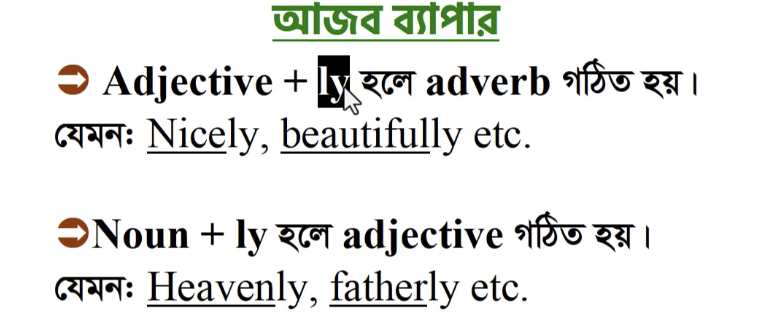
Simple Sentence থেকে Complex Sentence তৈরি / বাক্য বড় করা হয় যেভাবে
A campervan, also referred to as a camper, caravanette, motorhome or RV (recreational vehicle) in North America, is a self-propelled vehicle that provides both transport and sleeping accommodation.
###
Simple–Complex– Compound
Simple: He works hard to succeed.
(সফল হতে সে কঠোর পরিশ্রম করে)
Complex : He works hard so that/in order that/that he may/can succeed. (সে কঠোর পরিশ্রম করে যাতে সে সফল হতে পারে)
Compound: He desires/wishes/wants to succeed, therefore he works hard.
(সে সফল হতে চায়, সেজন্য সে কঠোর পরিশ্রম করে)
Or, He works hard and he wants to succeed.
Degree বা Comparison of Adjective:::
Degree মুলত ‘তুলনা করতে’ ব্যবহার করা হয়। এক বা একাধিক ব্যক্তি বা বস্তুর সাথে তুলনা করাকে degree বলে। যেমন-
((good—better—best; Famous—more Famous—most famous))
Degree তিন প্রকার। যথা:-
• Positive Degree: No comparison(নিজের সাথে তুলনা) [চেনার উপায়ঃ as/so থাকবে]
• Comparative Degree: 2 things/people comparison (অন্যকারো সাথে তুলনা)[চেনার উপায়ঃ than থাকবে]
• Superlative Degree: More than 2 things/people comparison (সবার সাথে তুলনা)[চেনার উপায়ঃ the থাকবে]
নিচের দুইটা টেবিল আলাদাভাবে মনে রাখলে খুব সহজে Degree নির্ণয় করা যায়:-
মেইন ২টা রুলস এর টেবিল:
Table1 (Singular)
• Positive Degree: No other
[No other+Superlative এর পরের অংশ+is/was+as/so+Degree1+as+Sub]
(No other boy in the class is as good as Rahim)
• Comparative Degree: Than any other/ than all other
[Sub+verb+Degree2+than any other/than all other]
(Rahim is better than any other boy in the class.)
• Superlative Degree: is(verb) + the + superlative
[Sub+verb(is)+the+Degree3+বাকি অংশ]
(Rahim is the best boy in the class)
Table2 (Plural)
• Positive Degree: very few
[]
(Very few boys in the class are as good as Rahim)
• Comparative Degree: than most other/than few other
[]
(Rahim is better than most other boys in the class.)
• Superlative Degree: One of the
[]
(Rahim is one of the best boys in the class.)
Table3(Affirmative & Negative)
আরো ১টা রুলস যেটার Superlative form হয় না, শুধু Positive ও Comparative form হয়:-
• as/so….as [Positive form of Affirmative]→than [Comparative form of Negative]
(Rana is as good as Kana.→Kana is not better than Rana.)
• as/so….as [Positive form of Negative]→than [Comparative form of Affirmative]
(Rana is not as good as Kana.→Kana is better than Rana.)
Identification & Transformation of
Simple, Complex, Compoud:::
Identification/চিহ্নিতকরণ::-
Simple : 1 principal Clause (1F.Verb/1Sub) থাকে। যেমন- I wish him to be a singer.
[Finite verb: যে verb দ্বারা বাক্যের tense নির্ণয় করা/চেনা যায় অথবা, যে verb এর আগে sub থাকে, তাকে Finite verb বলে।]
Complex : 1 principal C., 1 subordinate C. থাকে। যেমন- If you try a lot you will be the best one.
[Complex এ ব্যবহৃত হয়] = *** subordinate Clause:
• Noun Clause(Conjunction, interrogative pronoun, interrogative adverb),
• adjective clause,
• adverbial clause
[অনেকগুলো Clause Marker আছে(FAN BOYS এর গুলো ব্যতিত ও কিছু Coordinate conjunction ব্যতিত)]
কিছু গুরুত্বপূর্ণ subordinate Clause marker:-
if, As, Since, unless, so that, than, that, in order that, though, although, when, WH.Q,(who,which,where etc) ইত্যাদি।
[Subordinate Clause: যে Clause নিজে নিজে পরিপূর্ণ অর্থ প্রকাশ করতে পারে না, অর্থ প্রকাশের জন্য Principal Clause/Independent Clause-এর উপর নির্ভর করে তাকে Subordinate Clause/Dependent Clause বলে।]
Compoud : 2 principal C(with Conjunction-&,or,but etc) // 1 principal C & 1 Coordinate C থাকে। যেমন- I looked at you and became surprised.
[Compound এ ব্যবহৃত হয়] = *** Coordinate Clause:
• ৭টা মেইন Clause Marker(FAN BOYS),
• এছাড়াও কিছু Coordinate conjunction(therefore, then, else, however, well, whereas, while, how etc)
শর্টকাট ফর্মুলাঃ-
F = for
A = and, also, as well as, এছাড়া- and not, and so, both…and
N = nor, now, nevertheless, এছাড়া- not only…but also, no less
B = but
O = or, only, otherwise, এছাড়া- either…or, neither…nor
Y = yet
S = so, still
Transformation of Simple, Complex, Compoud
(1)Transformation::-
Complex : if + Affirmative
Simple : By + v.ing
Compoud : And (3rd person→let)
Cox: If you run fast, you will get the train.
Sim. By running fast, you will get the train.
Com: Run fast and you will get the train.
Cox: If he runs fast. he will get the train.
Sim: By running fast, he will get the train.
Com: Let him run fast and he will get the train.
(2)Transformation::-
Complex : if + Negative/unless
Simple : Without + v.ing
Compoud : or
Cox: If you do not study, you will fail.
Sim: Without studying you will fail.
Cam: Study or you will fail.
—
(3)Transformation::-
Complex : so that
Simple : to/ in order to
Compoud : and (want/wants)
যেমন:-
Complex : We eat so that we can live.
Simple : We eat to live.
Compoud : we want to to live and so we eat.
(4)Transformation::-
Cox: So….that
Sim: (too….to), Aff(enough…to)
Com: and(very)
যেমন:-
Cox: He is so weak that he cannot walk.
Sim: He is too weak to walk.
Com: He is very weak and he cannot walk.
(5)Transformation::-
Cox: though/Although
Sim: In spite of + v.ing
Com :But/yet
Cox: Though he is poor, he is honest.
Sim: In spite of being poor, he is honest.
Com: He is poor but honest.
(next ৩টা রুলস মিল আছে)
(6)Transformation::-
Cox: (Since/as/when যুক্ত Complex বাক্যের ক্ষেত্রে main verb যুক্ত ২টি clause এর Sub একই হয়, ২টা clause এর main verb থাকে।)
Sim: v.ing (একটা Finite verb, আরেকটা Non-Finite verb)
com: and/therefore
Cox: When she saw the teacher, she ran away.
Sim: Seeing the teacher, she ran away.
Com: She saw the teacher & she ran away.
(7)Transformation::-
Cox: (Since/as/when যুক্ত Complex বাক্যের ক্ষেত্রে be verb যুক্ত ২টি clause এর Sub একই হয়, ২টা clause এর main verb থাকে।)
Sim: being
com: and/therefore
Cox: As they are lazy, they will fail.
Sim : Being lazy, they will fail.
com: They are lazy and they will fail.
(8)Transformation::-
Cox: v.ing (Since/as/when যুক্ত Complex বাক্যের ক্ষেত্রে be verb যুক্ত ২টি Sub ভিন্ন হয়, ২টা clause এর main verb থাকে।)
Sim: sub + being + ad + sub + ext
com: and/therefore
Cox: As the weather was bad, we didn’t go out.
Sim: The weather being bad, we didn’t go out.
Com: The weather was bad and we didn’t go out.
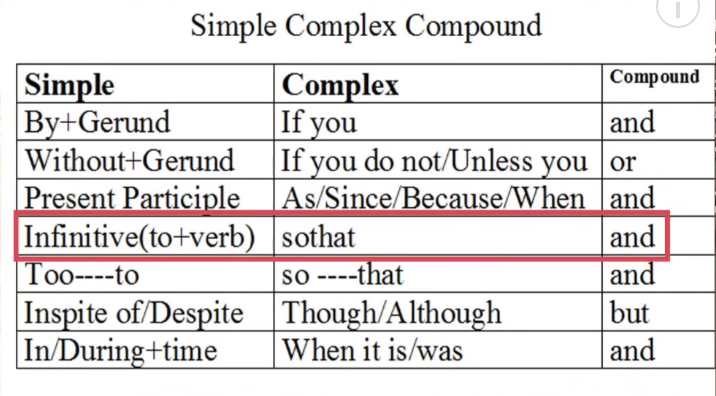
| SIMPLE | COMPLEX | COMPOUND |
| By+Gerund | If you | and |
| Without+Gerund | If you do not/Unless you | Or |
| Present Participle | As/Since/Because/When | and |
| Infinitive(to+verb) | so that | and |
| Inspite of/Despite | Though/Although | but |
| In/During +time | When it is/was | and |
trick/গাইডলাইনঃ Complex টা দেখে চিহ্নিত করে বাকি Simple, Compoud Sentence করব। এটাই easiest way!
COMPLEX: so….that… cannot/could not গঠন: Sub + verb1/2+ so + adjective + that + sub + cannot/could not + verb1 + obj
SIMPLE: Too….to গঠন: Sub + verb1/2 + too + adjective + to + verb1 + obj
COMPOUND: Very….and… cannot/could not গঠন: Sub+verb1/2+very+adjective +and+ Sub+cannot/could not+verb1+ obj
COMPLEX: The boy is so weak that he cannot walk.-ছেলেটি এত দুর্বল যে সে হাটতে পারে না।
SIMPLE: The boy is too weak to walk.-ছেলেটি হাটতেও দুর্বল।
COMPOUND: The boy is very weak and he cannot walk.-বালকটি খুবই দুর্বল এবং সে হাটতে পারে না।
১
SIMPLE: Too….to
গঠন: Sub + verb1/2 + too + adjective + to + verb1 + obj
SIMPLE: The boy is too weak to walk.-ছেলেটি হাটতেও দুর্বল।
COMPLEX: so….that… cannot/could not
গঠন: Sub + verb1/2+ so + adjective + that + sub + cannot/could not + verb1 + obj
The boy is so weak that he cannot walk.-ছেলেটি এত দুর্বল যে সে হাটতে পারে না।
COMPOUND: Very….and… cannot/could not
গঠন: Sub+verb1/2+very+adjective +and+ Sub+cannot/could not+verb1+ obj
The boy is very weak and he cannot walk.-বালকটি খুবই দুর্বল এবং সে হাটতে পারে না।
২
SIMPLE: too..for….to
গঠন: Sub + Verb1/2 + too + adj + for + objective form(২য় Sub) + to + verb1 + ext
কুলিটির জন্যে বোঝাটি তুলতেও ভারী। = The load is too heavy for the porter to lift.
COMPLEX: so……that… cannot/could not
গঠন: Sub + Verb1/2 + so + adjective + that + Sub(২য়) + cannot/could not + Verb1 + ext
বোঝাটি এতই ভারী যে কুলিটি তুলতে পারে না। = The load is so heavy that the porter cannot lift ..
COMPOUND: very…and… cannot/could not
গঠন: Sub + Verb1/2 + very + adj + and + Sub(২য়) + cannot/could not + Verb1 + ext
বোঝাটি খুব ভারী এবং কুলিটি তুলতে পারে না । The load is very heavy and the porter cannot lift .
৩
SIMPLE: too…to be [Subject ভিন্ন হলে ‘না-বোধক’ বোঝালে এবং ১ম Sub ২য় Sub এর কাজ করতে না পারলে]
গঠন: Subject + Verb1/2 + too + adjective + to be + Verb(P.P.F.) + ext
লোকটি অতি অসৎ শ্রদ্ধা না পাওয়ার মতো। = The man is too dishonest to be respected .
N. B. এখানে লক্ষ কর, এ জাতীয় বাক্যে হয় Sub অনুপস্থিত থাকে/ব্যবহৃত হয়নি। অর্থাৎ ‘অশ্রদ্ধা করা’ কাজটি ১ম Sub অর্থাৎ ‘The man’ দ্বারা সম্পন্ন হচ্ছে না, এ কাজটি করবে অন্যান্য লোকজন অর্থাৎ ‘other people’ যাকে অনুপস্থিত রাখা হয়েছে।
COMPLEX: so….that… cannot/could not
গঠন: Sub(১ম) + Verb1/2 + so + adjective + that + Sub(২য়) + cannot/could not বা do not/did not + Verb1 + ext
লোকটি এতটাই অসৎ যে লোকজন তাকে সম্মান করে না।= The man is so dishonest that people cannot/do not respect him.
N. B. এখানে লক্ষ করছ, হয় Subject ব্যবহৃত হয়েছে এবং ২য় Subject- এর বাক্যটিকে Active form- এ রাখা হয়েছে ।
COMPOUND: very…and…nobody/everybody
গঠন: Sub(১ম) + Verb1/2 + very + adj + and + Sub(২য়) + Verb1/2 + ext
The man is very dishonest and nobody respects him. = লোকটি খুব অসৎ এবং কেউই তাকে সম্মান করে না ।
N. B. দুটি Subject পৃথক পৃথক ব্যবহৃত হওয়ায় এবং হয় Subject-টি Nobody কিংবা None ব্যবহৃত হওয়ায় হয় বাক্যে cannot / could not ব্যবহৃত হয়নি।
৯
SIMPLE: to/ in order to [কোনো উদ্দেশ্যে কোনো কাজ করা বোঝালে]
গঠন: Sub + Verb + ext + to + Verb (Present) বা in order to + Verb (Present) + ext
He came to me to know the matter/in order to know the matter. = সে আমার নিকট এলো বিষয়টি সম্পর্কে জানার জন্যে।
He opened a bank account to save his money.
I work hard to get a good result.
COMPLEX: so that/ in order that… can/could
গঠন: Sub + Verb + ext + so that + Subject + can / could + Verb (Present) + ext
He came to me so that he could know the matter. = সে আমার নিকট এলো যাতে সে বিষয়টি বোঝতে পারে।
He came to me to know the matter/in order to know the matter.
I work hard so that I can get a good result.
COMPOUND: and…wants/wanted-can/could
গঠন: Sub + Verb + ext + and + Sub. + Verb + ext
He came to me and he wanted to know the matter. = সে আমার নিকট এলো এবং সে বিষয়টি বোঝতে চেয়েছিল।
He opened a bank account and he could save his money.
I work hard and want to get a good result.
৪
SIMPLE: to [Subject একই হলে এবং বাক্যটি ‘হ্যাঁ-বোধক’ বোঝালে]
গঠন: Subject + Verb (Present /Past) + adjective + enough + to + verb ( Present ) + O.W.
The girl is innocent enough to believe any man. = বালিকাটি খুব সহজ/সরল যে কোনো মানুষকে বিশ্বাস করতে ।
The question is easy enough for anybody to answer. = প্রশ্নটি সকলের উত্তর দেয়ার জন্য যথেষ্ট সহজ।
COMPLEX: so….that… can/could-anybody/nobody
গঠন: Sub + Verb1/2 + so + adj + that + Sub + can/could + Verb1 + ext
The girl is so innocent that she believes anybody. = বালিকাটি এতই সরল যে,সে যে কাউকে বিশ্বাস করে।
(N. B. উপরের উদাহরণটিতে can/could ব্যবহার করার প্রয়োজন হয়নি। সেক্ষেত্রে শুধু মূল ক্রিয়া(Verb) tense অনুযায়ী ব্যবহৃত হবে।)
The question is so easy that anybody can answer. = প্রশ্নটি এতই সহজ যে, যে কেউ উত্তর দিতে পারে।
(N. B. এখানে can ব্যবহৃত হয়েছে।)
COMPOUND: very…and…nobody/everybody
গঠন: Sub + Verb1/2 + very + adj + and + Sub(২য়) + can/could + Verb1 + ext
বালিকাটি খুবই সরল এবং সে যে কাউকে বিশ্বাস করে। = The girl is very innocent and she believes anyone.
(N. B. উপরের উদাহরণটিতে can/could ব্যবহৃত হয়নি।)
প্রশ্নটি খুবই সহজ এবং যে কেউ উত্তর দিতে পারে।= The question is very easy and anybody can answer .
(এখানে উদাহরণটিতে can ব্যবহৃত হয়েছে।)
৫
SIMPLE: for…to [Subject ভিন্ন ও বাকাটি ‘ হ্যাঁ-বোধক বোঝালে]
গঠন: Subject + Verb1/2 + adjective + enough + for + object (২য় Subject ) + to + Verb1 + ext
The essay is easy enough for any student to memorize. = রচনাটি যে কোনো ছাত্রের জন্য মুখস্থ করা সহজ ।
COMPLEX: so….that… can
গঠন: Sub(১ম) + Verb1/2 + so + adjective + that + (২য় Sub)+ can/could + Verb1 + ext
রচনাটি এত সহজ যে , যে কোনো ছাত্র তা মুখস্থ করতে পারে ।
The essay is so easy that any student can memorize .
COMPOUND: Very…and…can/could
গঠন: Sub + Verb1/2 + Very + adjective + and + Sub + can/could + Verb1/2 + ext
The essay is very easy and any student can memorize. = রচনাটি খুব সহজ এবং যে কোনো ছাত্র তা মুখস্থ করতে পারে ।
৬
SIMPLE: enough + to be [Sub ভিন্ন ও বাক্যটি ‘হ্যা-বোধক’ এবং ১ম Sub ২য় Sub এর কাজ করতে না পারলে অর্থাৎ হয় অংশটি Passive form হলে]
গঠন: Sub+ Verb1/2 + adjective + enough + to be + Verb.(P.P.F.) + ext
The man is honest enough to be respected. = শ্রদ্ধা করার মতো লোকটি যথেষ্ট সং।
COMPLEX: so…that…can/could
গঠন: Sub(1) + Verb1 + so + adjective + that + Subject(২য়) + can/could + Verb1 + O.W.
The man is so honest that everybody respects him. = লোকটি এত সহ যে প্রত্যেকে তাকে শ্রদ্ধা করে ।
COMPOUND: very…and….
গঠন:Sub(১ম) + Verb1/2 + very + adjective + and + Sub(২য়) + Verb1/2 + ext
The man is very honest and everybody respects him. = লোকটি খুব সৎ এবং প্রত্যেকে তাকে সম্মান করে।
১৬
গঠন-১:
SIMPLE: একটি কাজ আগে এবং অপরটি পরে অনুষ্ঠিত হবে বোঝাতে-
গঠন-১: Having + Verb-এর P.P form + ext. + Subject + Verb-এর Past form + ext
Having forgotten him, I went outside. = তাকে ভুলে গিয়ে আমি বাইরে গেলাম ।
বাক্যটি Passive form-এর হলে-
গঠন-২: Having + been + Verb-এর P.P form + O. W. + Subject + Verb + ext
Having been dismissed from the job, the man is now at a loss. = চাকরি হারিয়ে লোকটি এখন দিশেহারা।
Complex:
গঠন-১: When /After + Subject + have/had + Verb-এর P.P form + Sub + Verb-এর Past form + ext
After I had forgotten him, I went outside. = তাকে ভুলে যাওয়ার পর আমি বাইরে গেলাম।
গঠন-২: When + Sub + Verb + 0.W. + Sub + Verb + O.W.
When the man lost the job, he was at a loss. = যখন লোকটি চাকরি হারাল তখন সে দিশাহারা হলো।
Compound-
গঠন১: Subject + Verb-এর Past form + ext + and + Subject + Verb-এর Past form + ext
I forgot him and I went outside. = আমি তাকে ভুলে গেলাম এবং আমি বাইরে চলে গেলাম ।
গঠন-২: The man was dismissed and he was at a loss. = লোকটি চাকরি হারাল এবং নিশেহারা হলো।
15.
SIMPLE: At the time of + Verb এর ing/at + time দ্বারা বোঝায় কোনো কাজ করার সময়। এই Phrase-যুক্ত বাক্যটির গঠন হলো:
গঠন: Subject + Verb + O. W. + at the time of + Verb + ing + O.W.
He woke up at the time of raining. = বৃষ্টি হওয়ার সময় সে জেগে উঠল।
He came here at four. = সে এখানে ৪টায় এসেছিল।
Complex: গঠন: When/while + Subject + Verb +O.W. + Subject + Verb + O.W.
When it was raining, he woke up. = যখন বৃষ্টি হচ্ছিল তখন সে জেগে উঠল।
He came here when it was four. = যখন ৪টা বাজে তখন সে এসেছিল।
Compound- গঠন: Subject + Verb + 0. W. + and + Subject + Verb + O.W. + then.
He woke up and it was raining then. = সে জেগে উঠল এবং তখন বৃষ্টি হচ্ছিল।
It was four and he came. = এখন ৪টা এবং সে এল।
২১
SIMPLE: গঠন: Just at the time of + Verb.ing + O.W, + Sub. + Verb + O.W.
Just at the time of coming here, I saw him. = ঠিক এখানে আসার সময় আমি তাকে দেখলাম।
বি. দ্র. এখানে Phrase টি ধারা ঠিক কোনো কাজ করার সময়কে বোঝায়।
COMPLEX: গঠন: As soon as + Sub + Verb + O.W, + Sub. + Verb + O.W.
As soon as I came here, I saw him. = যেই না আমি এখানে আসলাম, আমি তাকে দেখলাম।
COMPOUND: গঠন: Sub + Verb + O.W. + and + just then, + Sub.+ Verb + O.W.
I came here and just then I saw him. = আমি এখানে আসলাম এবং ঠিক তখনি আমি তাকে দেখলাম।
# extra-1
গঠন-১:
SIMPLE: Because of + মুল Verb এর সাথে ing
গঠনঃ Because of + V + ing +extension + (Comma) , + Sub +verb + extension.
উদাহরনঃ Because of working hard, he passed in the exam.
Complex: Since/As/Because
গঠনঃ Since /As /Because + Sub+Verb +extension + (Comma) + Sub + verb + Extension
উদাহরনঃ Since he worked hard , he passed in the exam.
Compound: And/And so
গঠনঃ Sub + verb + extension + and + Verb + extension.
উদাহরনঃ He worked hard and passed in the exam.
গঠন-২: Because of + sub এর possessive + v.ing = as/since = …and…
# extra-2
গঠন-১:
SIMPLE: (Subject একই হলে) মুল Verb এর সাথে ing –
গঠনঃ Verb.ing + extension + (Comma) + Sub + verb + extension
উদাহরনঃ Going to market , he bought a car.
Complex: Since/As/Because
গঠনঃ Since / As / Because + Sub + verb + (Comma) + Sub + Verb + Extension.
উদাহরনঃ Since he went to market, he bought a car.
Compound- And/And so
গঠনঃ Sub + verb + Extension +and/ and so + Sub + verb +Extension.
উদাহরনঃ He went to market and he bought a car.
গঠন-২:
SIMPLE: (Subject ভিন্ন হলে) মুল Verb এর সাথে ing –
উদাহরনঃ The weather being cold, he could no go out.
Complex: Since/As/Because
উদাহরনঃ Since the weather was cold, he could not go out.
Compound: And / And so
উদাহরনঃ Since the weather was cold, he could not go out.
৭ .
SIMPLE: কোনো কাজের ‘কারণ’ উল্লেখ করতে-
গঠন: Because of + Sub-এর Possessive form + Noun, + Sub + Verb1/2 + Obj
Because of his illness, he was absent in the school. = অসুস্থতার জন্য সে কলেজে অনুপস্থিত ছিল।
গঠন : Because of + Sub-এর Possessive form + being/having + Adjective/Noun + Subject + Verb + Obj
Because of his being honest, people respect him. = সে সৎ বলে লোকজন তাকে শ্রদ্ধা করে ।
Because of his having qualification, he got the job. = তার যোগ্যতা ছিলো বলে সে চাকরিটা পেল ।
Because of his being experienced, he got the job. = অভিজ্ঞ হওয়ার কারণে সে চাকরিটি পেল ।
Complex: গঠন: Since/As/Because + Sub + Verb1/2 + Obj, + Sub + Verb1/2 + Obj
Since/As/Because he is ill,he did not go to school. = যেহেতু সে অসুস্থ, সে কলেজে যায়নি।
# N.B. এখানে since বা as বা because শুরুতে ব্যবহৃত হলে এর অর্থ হবে ‘যেহেতু ‘।
As he is honest, people respect him. = যেহেতু সে সৎ, লোকজন তাকে সম্মান করে।
As he had qualification, he got the job. = যেহেতু তার যোগ্যতা ছিল, সে চাকরিটা পেল।
As he was experienced, he got the job. = যেহেতু সে অভিজ্ঞ, সে চাকরিটি পেল।
Compound- গঠন: Sub + Verb1/2 + adjective + and + Subject + Verb + O. W.
He was ill and he did not go to school. = সে অসুস্থ ছিল এবং সে কলেজে যায়নি ।
He is honest and people respect him. = সে সৎ এবং লোকজন তাকে সম্মান করে ।
He had qualification and he got the job. = তার যোগ্যতা ছিল এবং সে চাকরিটা পেল ।
He was experienced and he got the job. = সে অভিজ্ঞ ছিল এবং চাকরিটি পেল।
# extra-3
গঠন-১:
SIMPLE: Because of + having/ Having
উদাহরনঃ Because of having a lot of money, he has bought a car.
Complex: Since / As / Because
উদাহরনঃ Since he has a lot of money, he has bought a car.
Compound: And /And so
উদাহরনঃ He has a lot of money and he has bought a car.
গঠন-২:
SIMPLE: Because of + Noun / Noun Pharse.
উদাহরনঃ Because of his illness, he could not go to school.
Complex: Since/ As/Because
উদাহরনঃ Since he was ill, he could not go to school.
Compound: And / And so
উদাহরনঃ He was ill and so he could not got school.
গঠন-৩:
besides + v.ing = when/as/since = not only…but also
13.
SIMPLE: Present Participle দুভাবে ব্যবহৃত হয়; একটি কাজ আগে হয় এবং একটি কাজ পরে হয়। যে কাজটি আগে হয় সেটির ক্রিয়াপদের (Verb)-এর সাথে ing যোগ হবে-
গঠন০: Verb.ing + obj + Subject + Verb + obj
Closing the door, I went outside. = দরজা বন্ধ করে আমি বাইরে গেলাম।
Present Participle (Verb + ing) যখন Adjective-এর মতো কাজ করে তখন সেই Noun-এর পাশেই ব্যবহৃত হয় যার সম্পর্কে তথ্য দেয় বা যাকে বিশেষিত করে। Present Participle Phrase দুভাবে বিশেষিত করে। প্রথমত Subject-কে, দ্বিতীয়ত Object-কে।
গঠন-১: Sub + Verb.ing + Obj +Verb+ Obj
Some people working in the field are farmers. = কিছু লোক মাঠে কাজ করছে তারা হয় কৃষক।
গঠন-২: Sub + Verb + Obj(N)+ Verb.ing + Obj
I saw a boy running towards me. = আমি একটি বালককে আমার দিকে দৌড়াতে দেখলাম।
Complex: বামদিকের 13 নং বাক্যটিকে Complex করতে হলে নিম্নলিখিত গঠনগুলো অনুসরণ করতে হবে। যখন একটি কাজ আগে, অপরটি পরে হয় তখন নিম্নে প্রদত্ত গঠনটি অনুসরণ করতে হবে।
গঠন০: After + Past Perfect/Present Perfect + Present Indefinite/Past Indefinite
After I had closed the door, I went outside. = দরজা বন্ধ করার পর আমি বাইরে গেলাম।
যখন এক ব্যক্তি/বন্ধু/প্রাণী সম্পর্কে তথ্য প্রদান করে তখন নিম্নে প্রদত্ত গঠনটি অনুসরণ করতে হবে।
গঠন-১: Sub + Relative Pronoun(who, that, which, when etc) +Verb+ Obj + Verb + Obj অথবা, Sub + Verb + Obj + Relative Pronoun + Verb + Obj
Some people who are working in the field are farmers. Or, Some people are working in the field who are farmers. = কিছু লোক যারা মাঠে কাজ করছে তারা হয় কৃষক।
গঠন-২: Sub +Verb + Obj + Who + be verb + verb-এর সাথে ing + Obj
I saw a boy who was running towards me. = আমি একটি বালককে দেখলাম যে আমার দিকে দৌড়াচ্ছে ।
Compound: গঠন০: Subject + Verb + Obj + and + Subject + Verb + Obj
I closed the door and went outside. = দরজাটি বন্ধ করলাম এবং বাইরে গেলাম।
গঠন-১: Sub + Verb + Obj + and + Sub + Verb + Obj
Some people are working in the field and they are farmers. = কিছু লোক মাঠে কাজ করছে এবং তারা কৃষক।
গঠন-২: I saw a boy and he was running towards me. = আমি একটি বালককে, দেখলাম এবং সে আমার দিকে দৌড়াচ্ছে।
18.
SIMPLE: গঠন : Sub + Verb + the way of + possessive + Verb.ing + O.W.
বি.দ্র. এই phrase দ্বারা বোঝায় কাজটি কী উপায়ে করা যায়।
আমি তার কাজ করার উপায়টি জানি।
I know the way of his doing the work.
Complex: গঠন : Sub + Verb + how + Sub + Verb + O.W.
আমি জানি সে কেমন করে কাজটি করেছিল।
I know how he did the work.
Compound: গঠন: Sub + Verb + O. W. + and + Sub.+Verb + O.W.
সে কাজটা করেছিল এবং আমি তা জানি।
He did the work and I know that.
20.
SIMPLE: গঠন: Sub + Verb + O. W. + upto + Verb.ing + O.W.
ছাত্রছাত্রীরা শ্রেণিকক্ষে অবস্থান করবে পরীক্ষার খাতাগুলো শিক্ষকগণ নেয়া পর্যন্ত ।
Students will stay in the classroom up to taking examination sheets by their teachers.
বি.দ্র. উপরের phrase দ্বারা বোঝায় কোনো কাজ করা পর্যন্ত ।
Complex: গঠন : Sub + Verb + OW. + till/until + Sub. + Verb + O.W.
ছাত্রছাত্রীরা শ্রেণিকক্ষে অবস্থান করবে যতক্ষণ তাদের শিক্ষকগণ পরীক্ষার খাতাগুলো না নেয় ।
Students will stay in the classroom till/until their teachers take their examination sheets.
Compound: গঠন : Sub + Verb + O. W. + and + then + Sub. + Verb + O.W.
ছাত্রছাত্রীরা শ্রেণিকক্ষে অবস্থান করবে এবং তারপর তাদের শিক্ষকগণ পরীক্ষার খাতাগুলো নিবেন ।
Students will stay in the classroom and then their teachers will take their examination sheets.
২২
SIMPLE: গঠন: After + Verb.ing + 0.W. + Sub + Verb-এর Past /Present) + O.W.
After having breakfast, I went to school. = সকালের নাস্তা খেয়ে আমি বিদ্যালয়ে গিয়েছিলাম।
After having breakfast, I go to school. = সকালের নাস্তা খেয়ে আমি বিদ্যালয়ে যাই ।
বি.দ্র. After যুক্ত শব্দগুচ্ছটি দ্বারা কোনো কাজ করার পরে বোঝায়।
COMPLEX: Verb(Present//past)….after….have/has//had + Verb-এর Past Participle
গঠন-১ : Sub+Verb(Present) + O. W.+ after + Sub. + have/has + Verb-এর Past Participle form + O.W.
I go to school after I have taken breakfast. = সকালের নাস্তা করার পরে আমি বিদ্যালয়ে যাই।
গঠন-২: Sub + Verb (Past) + O. W. + after + Sub + had + Verb-এর Past Participle form + O. W.
I went to school after I had taken breakfast. = সকালের নাস্তা করার পর আমি বিদ্যালয়ে গিয়েছিলাম।
COMPOUND: and + then
গঠন : Sub + Verb + O. W. + and + then +Sub. + Verb + O.W.
I took my breakfast and then I went to school. = আমি নাস্তা খেলাম এবং তারপর আমি বিদ্যালয়ে গেলাম।
২৩
SIMPLE: গঠন: Sub +Verb+ the reason of + Sub এর Possessive form + Verb-এর ing/Noun + Obj
+ Verb-এর ing/Noun + O. W.
I know the reason of his absence. = আমি তার অনুপস্থিতির কারণ জানি।
He knows the reason of my coming home. = সে আমার বাড়ি আসার কারণ জানে।
Complex: why
I know why he is absent. = আমি জানি কেন সে অনুপস্থিত।
He knows why I have come home. = সে জানে আমি আমি কেন বাড়ি এসেছি।
Compound: গঠন : Sub + Verb + Obj + and + Sub + Verb + Obj
He is absent and I know the reason. = সে হয় অনুপস্থিত এবং আমি কারণটি জানি।
I have come home and he knows the reason. = আমি বাড়ি এসেছি এবং সে কারণটি জানে ।
২৪
SIMPLE: The place of + Verb.ing Or, at/in + place-যুক্ত Simple বাক্যের গঠনটি-
গঠন: Sub + Verb + the place of + Verb + ing or / at/in + place.
Do you know the place of his living? = তুমি কি তার থাকার জায়গাটি চেন?
I was born in Rajshahi. = আমি রাজশাহীতে জন্মগ্রহণ করেছিলাম।
COMPLEX: গঠন: Sub + Verb + OW. (N) + Where + Sub. + Verb + O.W.
Do you know where he lives? = তুমি কি জান কোথায় সে বাস করে?
It is Rajshahi where I was born. = এই রাজশাহীতেই আমি জন্মগ্রহণ করেছিলাম।
Compound: গঠন: Sub + Verb + OW. + and + Sub. +Verb + O.W.
It is Rajshahi and I was born here. = এটা রাজশাহী এবং আমি এখানে জন্মগ্রহণ করি।
২৬
SIMPLE: গঠন: Sub + Verb + Just Before + possessive + Verb.ing + Obj
The train left just before our reaching at the station. = ট্রেনটি ছেড়েছিল ঠিক আমরা স্টেশনে পৌঁছার আগেই।
COMPLEX: গঠন: No sooner had + Sub + Verb-এর Past Participle form + than + Sub + Verb-এর Past form + Obj
No sooner had we reached the station than the train left. = আমরা স্টেশনে পৌঁছতে না পৌঁছতেই ট্রেনটি ছেড়ে দিল।
Compound: গঠন: Sub + Verb-এর Past form + O.W.+and+ just then + Sub + Verb-এর Past form
We reached the station and just then the train left. আমরা স্টেশনে পৌঁছলাম এবং ঠিক তখনি ট্রেনটি ছেড়ে দিল।
10.
SIMPLE: কোনো কাজ করার মাধ্যমে অপরটি সমাধান করা হয়, এরূপ বোঝালে-
গঠন: By + Gerund(Verb+ing) + Obj + Sub + Verb + Obj
By working hard, you can prosper. = কঠোর পরিশ্রম করে তুমি উন্নতি করতে পারবে।
COMPLEX: গঠন: If(যদি) + Sub + Verb + Obj + Subject(২য়) + Verb + Obj
If you work hard, you can prosper. = যদি তুমি কঠোর পরিশ্রম করো তবে তুমি উন্নতি করতে পার।
Compound: গঠন: Subject + Verb + Obj + and + Subject + Verb + Obj
You work hard and you can prosper.= তুমি কঠোর পরিশ্রম করো এবং তুমি উন্নতি করতে পার।
(1)Transformation::-
Complex : if + Affirmative
Simple : By + v.ing
Compoud : And (3rd person→let)
Cox: If you run fast, you will get the train.
Sim. By running fast, you will get the train.
Com: Run fast and you will get the train.
Cox: If he runs fast. he will get the train.
Sim: By running fast, he will get the train.
Com: Let him run fast and he will get the train.
11.
SIMPLE: কোনো একটি কাজ না হলে অপর কাজটিও হবে না। এরূপ বোঝালে-
গঠন: Without + Gerund (Verb+ing) + Obj + Sub + cannot / could not + Verb(Present) + Obj
Without working hard, you cannot succeed. = পরিশ্রম ছাড়া তুমি সফল হতে পার না।
COMPLEX: গঠন: If/unless + Sub + Auxiliary verb + not + Verb + Obj + Sub + Verb + Obj
If you do not work hard, you cannot succeed. = তুমি যদি পরিশ্রম না করো তবে তুমি সফল হতে পারবে না।
Compound: গঠন: Verb + obj + or/otherwise + Subject + Auxiliary verb+not + Verb + Obj
Work hard or you cannot succeed. = পরিশ্রম করো, নইলে/অথবা তুমি সফল হতে পারবে না।
(2)Transformation::-
Complex : if + Negative/unless
Simple : Without + v.ing
Compoud : or
Cox: If you do not study, you will fail.
Sim: Withat studying you will fail.
Com: Study or you will fail.
৮ .
গঠন-১:
SIMPLE: ‘সত্ত্বেও’ বোঝালে-
গঠন: In spite of / Despite + Verb.ing/Noun/Noun phrase/Adjective = Noun (অর্থাৎ Adjective, Noun-এ পরিণত হবে) + Sub + Verb1/2 + obj
In spite of not doing well in the examination he passed. = পরীক্ষা ভালো না করা সত্ত্বেও সে পাস করল।
In spite of dishonesty, the authority does not take any step against him. = অসততা সত্ত্বেও কর্তৃপক্ষ তার বিরুদ্ধে কোনো পদক্ষেপ নেয় না।
COMPLEX:
গঠন: Though/Although(যদিও) + Sub + Verb + obj/Adjective + Subject + Verb + obj.
Though he did not do well in the examination, he passed. = যদিও সে পরীক্ষায় ভালো করেনি তবুও সে পাস করল।
Though he was dishonest, the authority didn’t take any step against him. = যদিও সে অসৎ, কর্তৃপক্ষ তার বিরুদ্ধে কোনো পদক্ষেপ নি না।
Compound:
গঠন: Sub + Verb + Obj + but + Subject + Verb + Obj
He did not do well in the examination but he passed. = সে পরীক্ষায় ভালো করেনি কিন্তু সে পাস করল।
He was dishonest but the authority did not take any step against him. = সে ছিল অসৎ কিন্তু কর্তৃপক্ষ তার বিরুদ্ধে কোনো পদক্ষেপ নিল না।
গঠন-২:
SIMPLE:
গঠন: In spite of + sub এর possessive form + being(am/is/are/was/were থাকলে) / having(have/has/had থাকলে) + verb1 + ing + ext + comma + main clause 2nd sentence-
In spite of his being poor, he is honest.
COMPLEX:
গঠন: Though/Although(যদিও) + Sub + Verb + obj/Adjective + comma + main clause
Though he is poor, he is honest.
Compound:
গঠন: Sub + Verb + Obj + but + main clause
He is pore but honest.
12.
SIMPLE: যখন কোনো ব্যক্তি/বস্তু/প্রাণী একই সাথে দুটো গুণের/দোষের অধিকারী হয়-
গঠন: Sub + Verb + both + a + Noun/Adjective + and + a + Noun/Adjecitve.
Nachiketa is both a singer and a composer. = নচিকেতা একজন গায়ক ও গীতিকার উভয়ই।
COMPLEX:গঠন: It is not that + Sub + Verb + only + Noun + Subject + Verb + also + Noun.
It is not that Nachiketa is only a singer, he is also a composer. = এমনটা নয় যে নচিকেতা শুধুমাত্র একজন গায়ক, তিনি একজন গীতিকারও বটে।
COMPOUND: গঠন: Subject + Verb + not only + a + Noun + but also + Subject + Verb + a + Noun.
Nachiketa is not only a singer but also (he is) a composer. = নচিকেতা একজন গায়কই নন, তিনি একজন গীতিকারও বটে।
25.
SIMPLE: গঠন: Sub.+Verb+Possessive of second subject + Noun + obj
I know his demand. = আমি তার দাবি/চাহিদা জানি।
COMPLEX: গঠন: Sub + Verb + what + Sub + Verb + obj
I know what he demands. = আমি জানি সে যা দাবি করে।
COMPOUND: গঠন: Sub + Verb + Conjunction + Sub +Verb + obj
He demands and I know it. = সে দাবি করে এবং আমি এটা জানি।
extra-
Relative pronoun/Relalive Fact:
Type-01
SIMPLE: participle(v.ing) + noun হলে-
I notice a standing man.
COMPLEX: Subjeet + verb + noun + who/which/that + is/was + উক্ত participle(v.ing) –
I notice a man who is standing.
COMPOUND: subjeet + verb + noun + and + it/ they/he/she + is/was/were + উক্ত participle(v.ing) –
I notice a man and he is standing.
Type-02
SIMPLE: Noun/pronoun + participle(v.ing)–
I saw him singing.
COMPLEX: Subjeet + verb + that + subject + is/was + উক্ত participle(v.ing) –
I saw that he was singing.
COMPOUND: Sub + verb + and + subject + is/was + উক্ত participle(v.ing) –
I saw and he was singing.
Type-03
SIMPLE: Determinent + adjective + noun হলে-
I saw a colourful picture.
COMPLEX: Sub + verb + noun + who/which/that + is/was + উক্ত participle(v.ing) –
I saw a picture which was colourful.
COMPOUND: subjeet + verb + noun + and + it + ২য় sentence
I saw a picture and it was colourful.
17.
SIMPLE: গঠন: Sub + Verb + adjective/noun-
Health is wealth. = স্বাস্থ্যই সম্পদ।
COMPLEX: গঠন: Subject (It) + Verb + Subject + which + Verb + Obj(Noun) .
It is health which is wealth. = এটাই স্বাস্থ্য যা সম্পদ।
COMPOUND: গঠন: Sub(It) + Verb + Object + and + Sub(that) + Verb + Object
It is health and that is wealth.= এটাই স্বাস্থ্য এবং এটা সম্পদ।
19.
SIMPLE: Past Participle অথবা Adjective যুক্ত Simple Sentence-
The broken leg of the chair was repaired. = চেয়ারের ভাঙা পায়াটি মেরামত করা হয়েছিল।
The writer rented a tiny apartment. = লেখক একটি ছোটো কামরা ভাড়া নিয়েছিলেন।
I saw a lame man. = আমি একজন খোঁড়া লোক দেখলাম।
COMPLEX: গঠন: Participle অথবা Adjective ব্যতীত সবটুকু অংশ + Who / Which + Verb + Participle বা Adjective.
The leg of the chair was repaired which was broken. = চেয়ারের পায়াটি মেরামত করা হয়েছিল যেটি ভাঙা ছিল ।
The writer rented an apartment which was tiny. = লেখক একটি কামরা ভাড়া নিয়েছিলেন যেটি ছিল ছোটো।
I saw a man who was lame. = আমি একজন লোক দেখেছিলাম যে ছিল খোঁড়া।
COMPOUND: গঠন: Sub + Verb + ext + and + Sub + Verb + ext
The leg of the chair was broken and it was repaired. = চেয়ারের পায়াটি ভেঙে গিয়েছিল এবং এটি মেরামত করা হয়েছিল।
The writer rented an apartment and it was tiny. = লেখক একটি কামরা ভাড়া নিয়েছিলেন এবং এটি ছিল ছোটো।
I saw a man and he was lame. = আমি একজন লোককে দেখলাম এবং সে ছিল খোঁড়া।
14.
SIMPLE: Past Participle Phrase বলতে মূল ক্রিয়ার তৃতীয় form এবং Obj-কে বোঝায়। এই Phraseটি Verb ও Adjective-এর মতো ব্যবহৃত হয়। উহা Subject বা Object-এর পরে ব্যবহৃত হয়ে Simple Sentence গঠন করে-
গঠন-১: Subject + Verb-এর Past Participle form + Object + Verb + Object
The book written by Humayun Ahmed is very interesting. = হুমায়ূন আহমেদের লেখা বইটি খুবই মজার।
গঠন-২: Subject + Verb + Object(Noun) + Verb-এর Past Participle form + Object
I bought a book of poems written by Rafiq Azad. = আমি রফিক আজাদের লেখা একটি কবিতার বই কিনেছিলাম।
COMPLEX:
গঠন-১: Sub + who/which/that + Verb + Object + Verb + Object
The book which is written by Humayun Ahmed is very interesting. = যে বইটি হুমায়ূন আহমেদের লেখা তা খুবই মজার ।
গঠন-২: Sub + Verb + Object(Noun) + who/which/that + Verb + Object
I bought a book of poems that/which is written by Rafiq Azad. = আমি একটি কবিতার বই কিনেছিলাম যা রফিক আজাদের লেখা।
COMPOUND: গঠন: Subject + Verb + Object + and + Subject + Verb + Object
The book is very interesting and Humayun Ahmed wrote it. = বইট খুব মজার এবং সেটা হুমায়ূন আহমেদ লিখেছিলেন।
I bought a book of poems and Rafiq Azad wrote that.= আমি একটি কবিতার বই কিনেছিলাম এবং রফিক আজাদ উহা লিখেছিলেন।
১ ২ ৩ ৪ ৫ ৬
৯
১৬, ১৫, ২১, extra-1, extra-2, ৭, extra-3, ১৩,
18, 20, 22, 23, 24, 26,
১০, ১১,
৮,
25, 12, 14, 17, 19.
#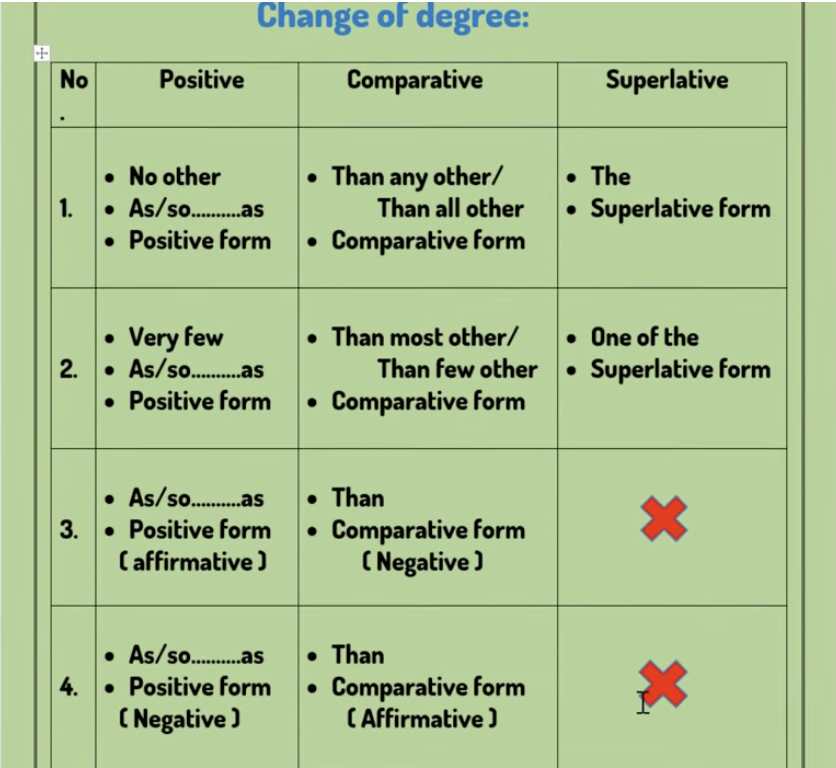
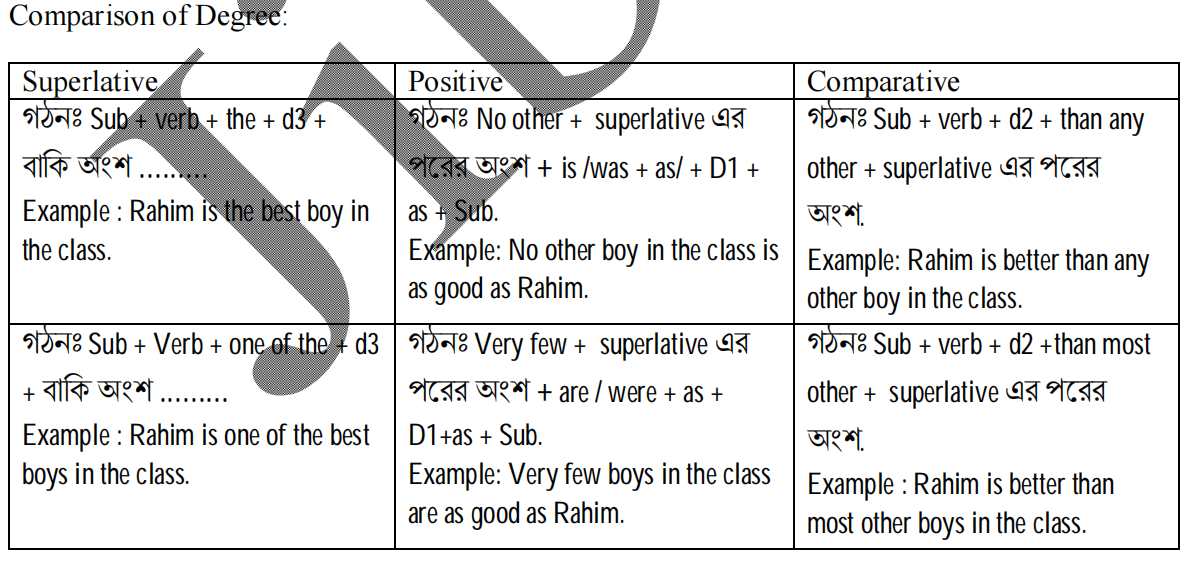 Transformation of Sentences by Jibon Sir.pdf – link#
Transformation of Sentences by Jibon Sir.pdf – link#
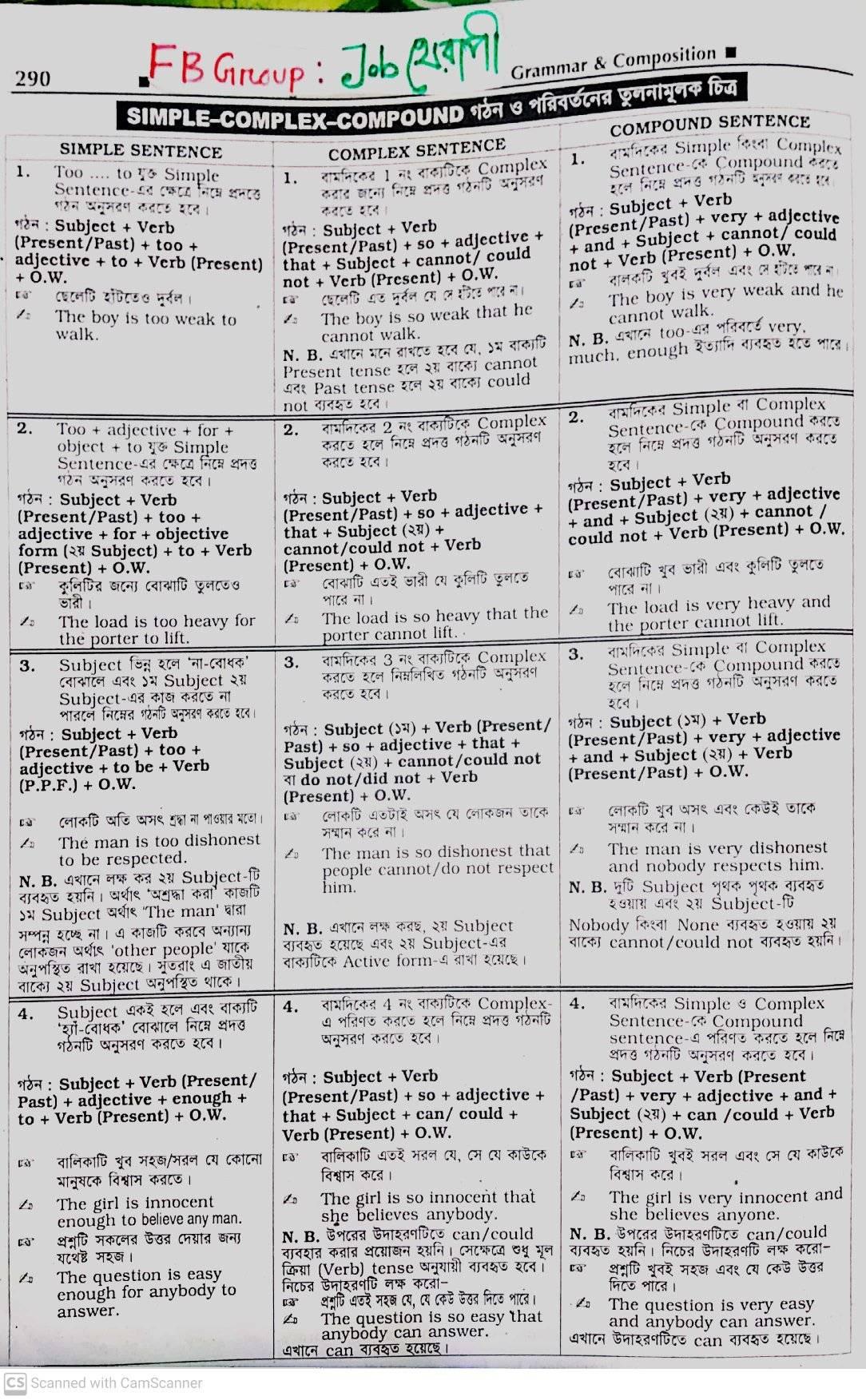

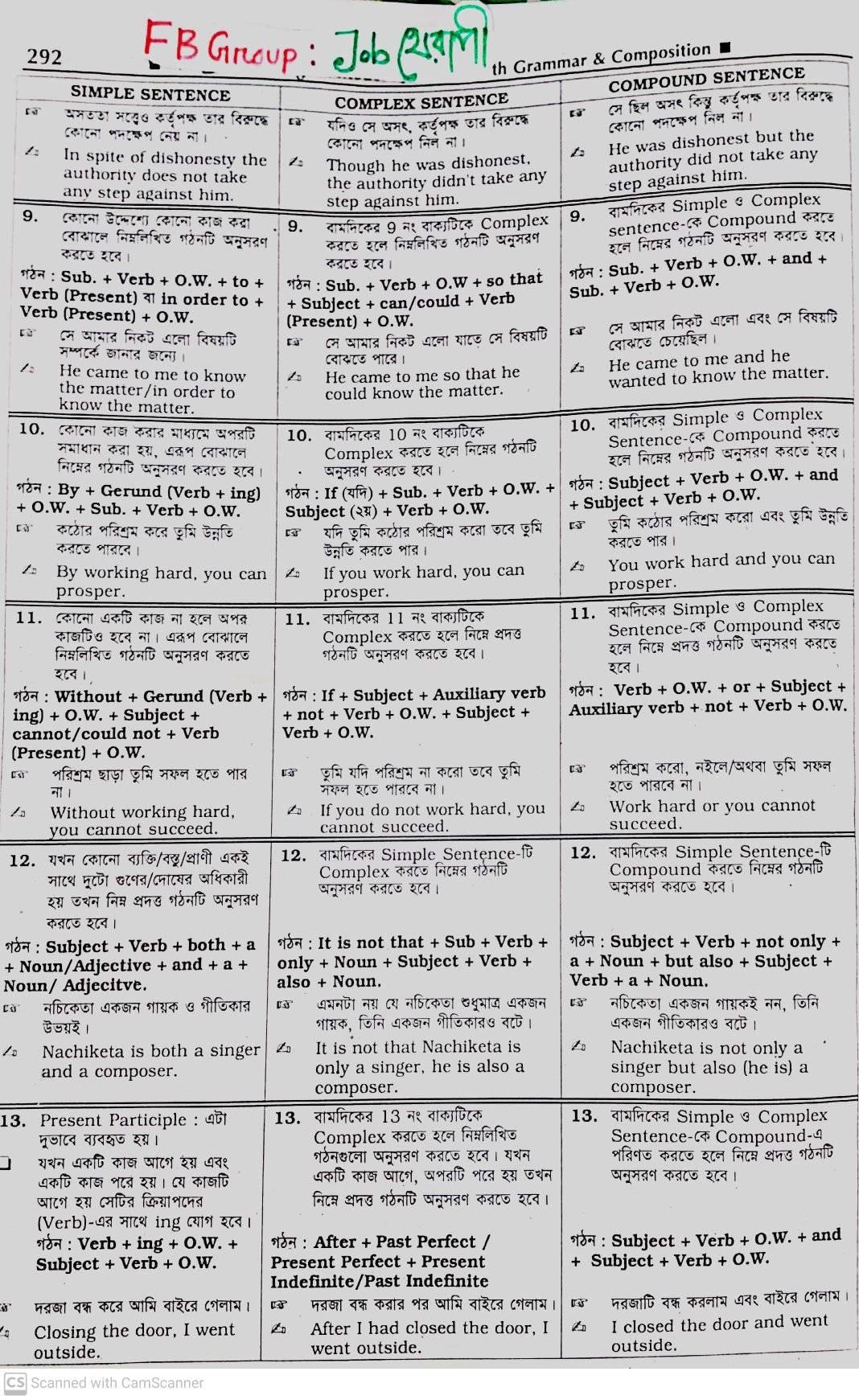
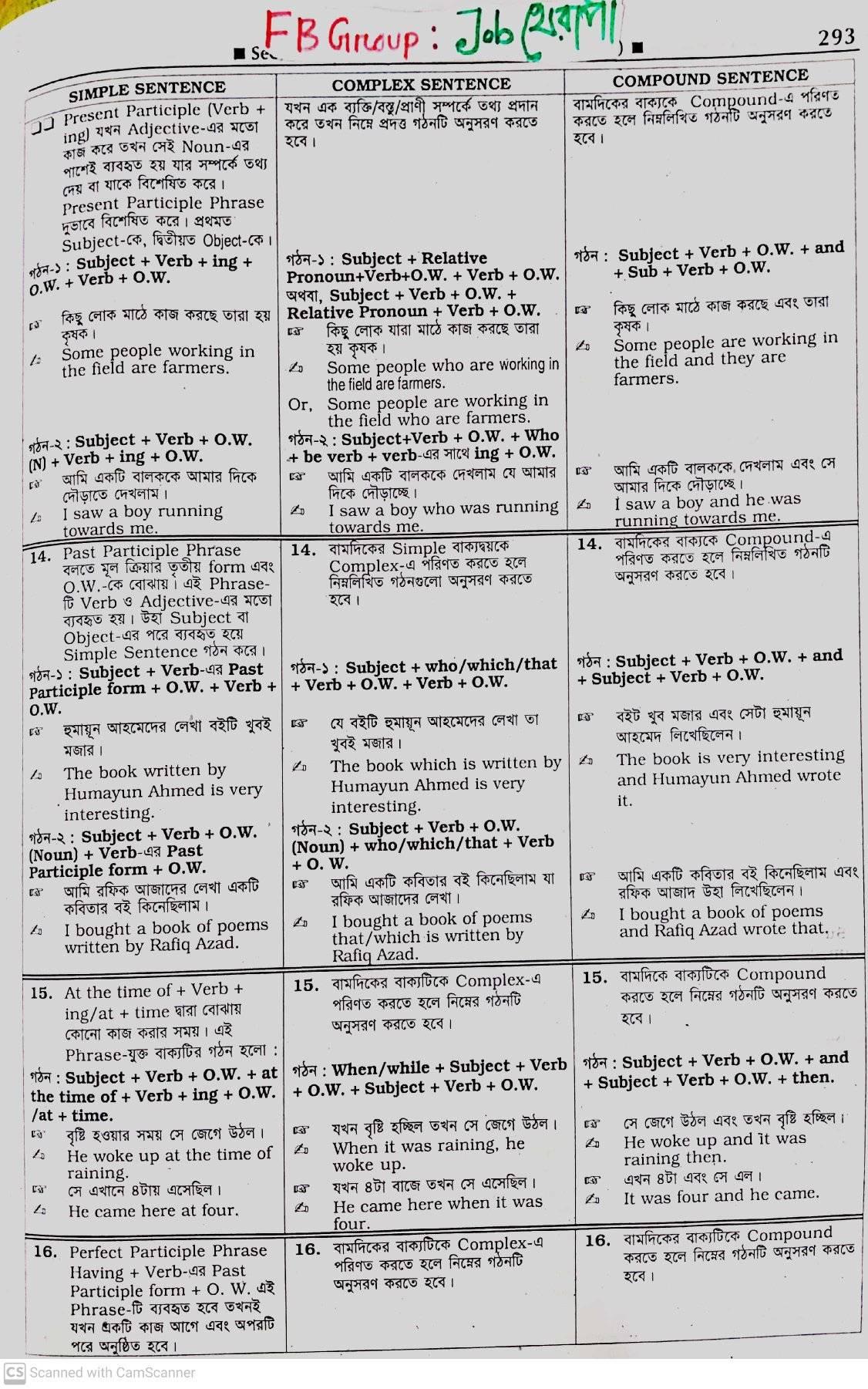
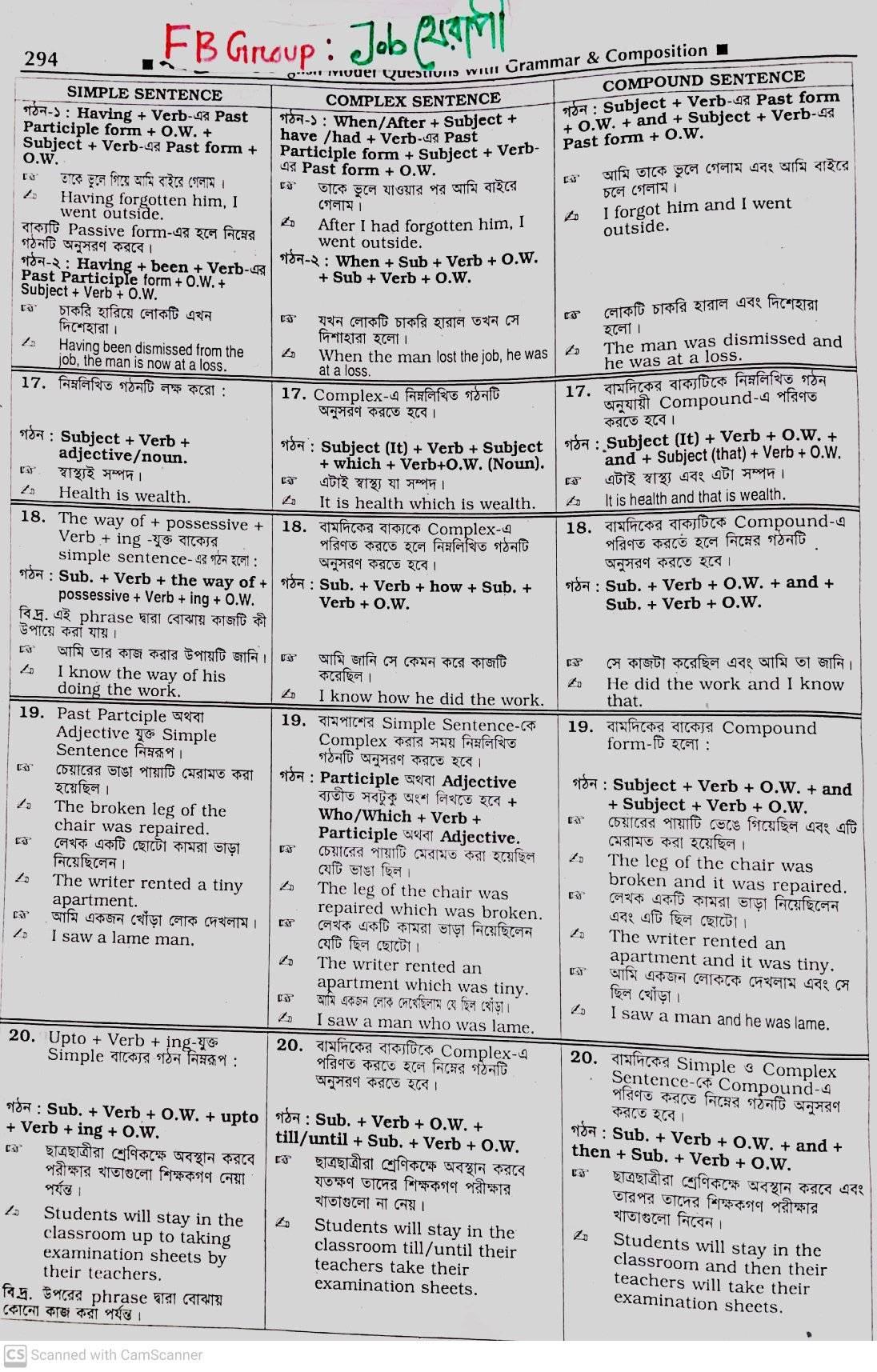
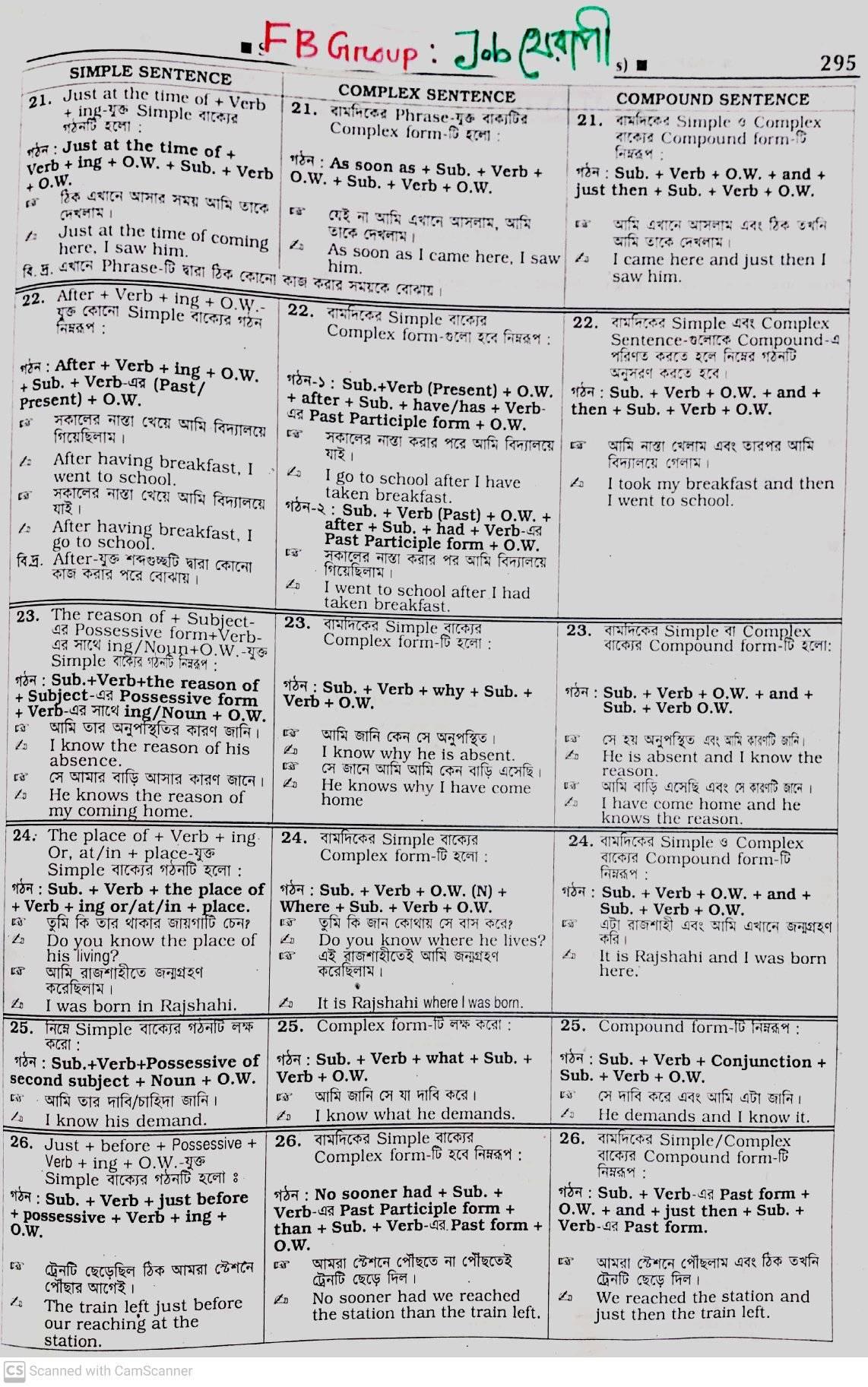
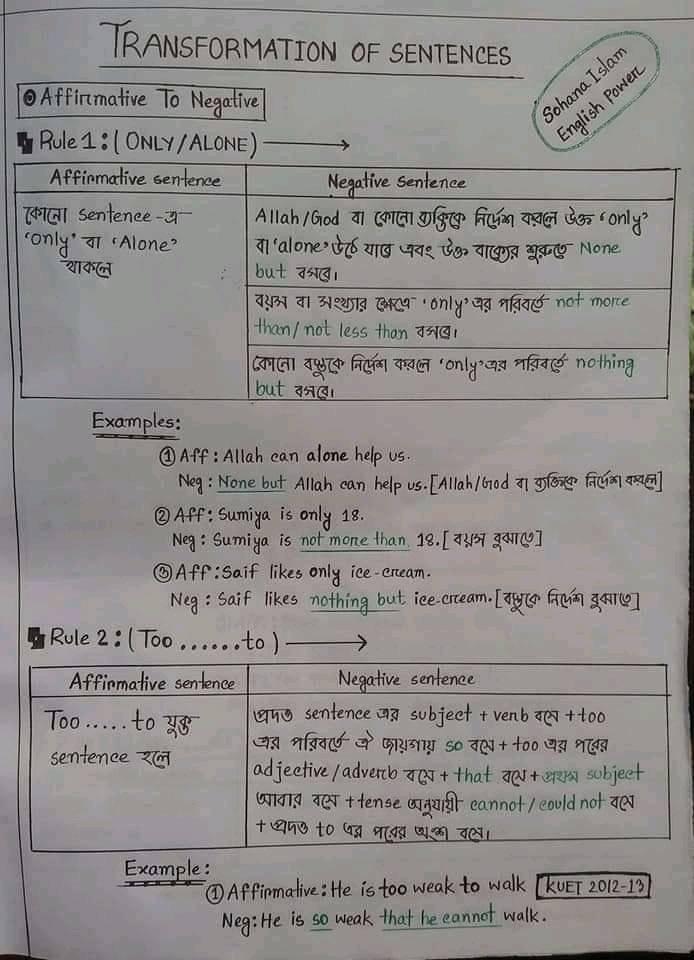
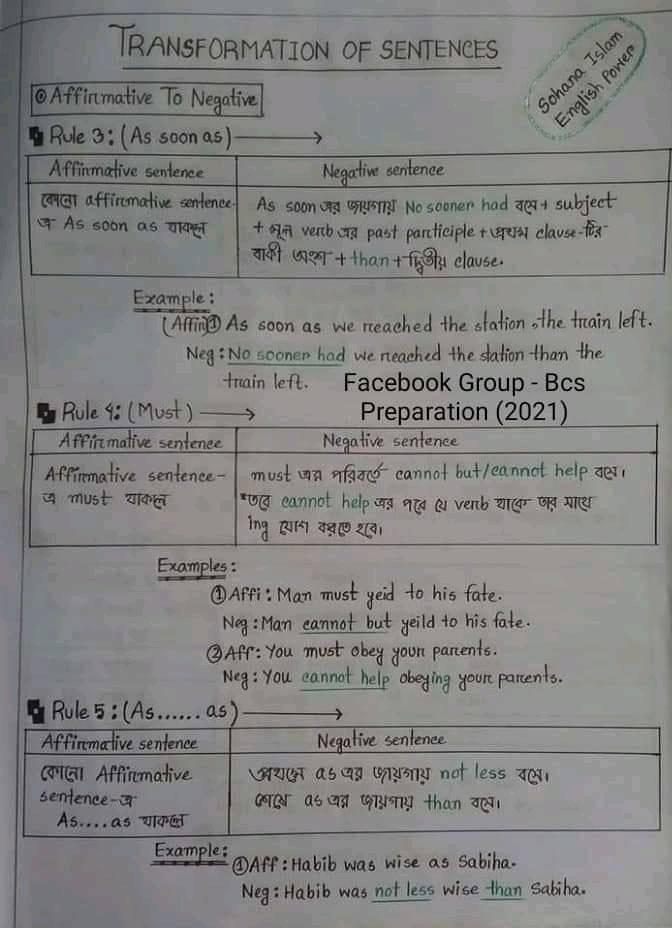
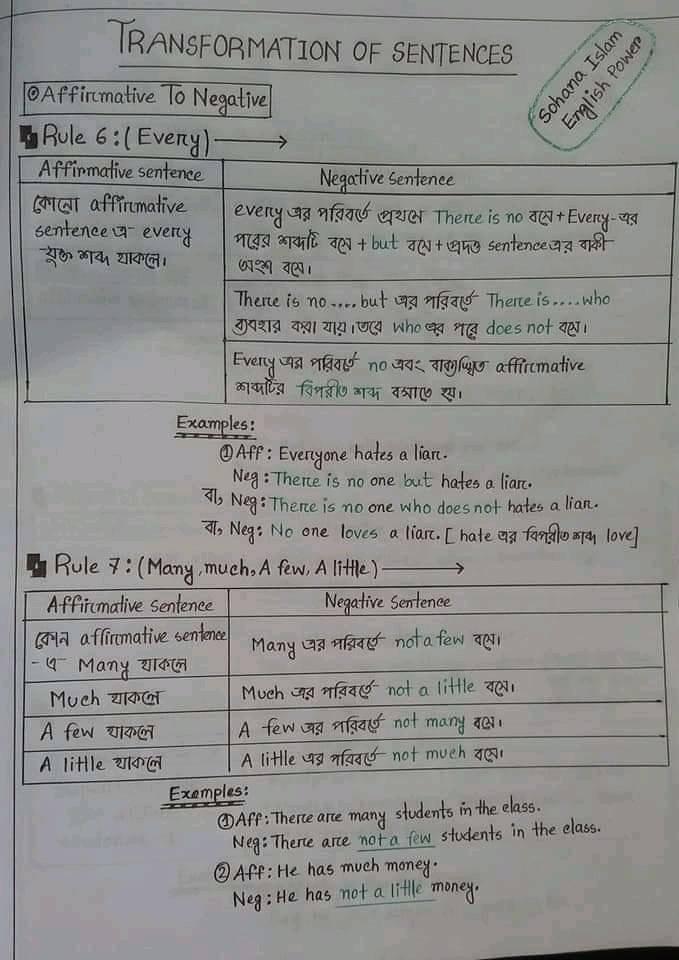
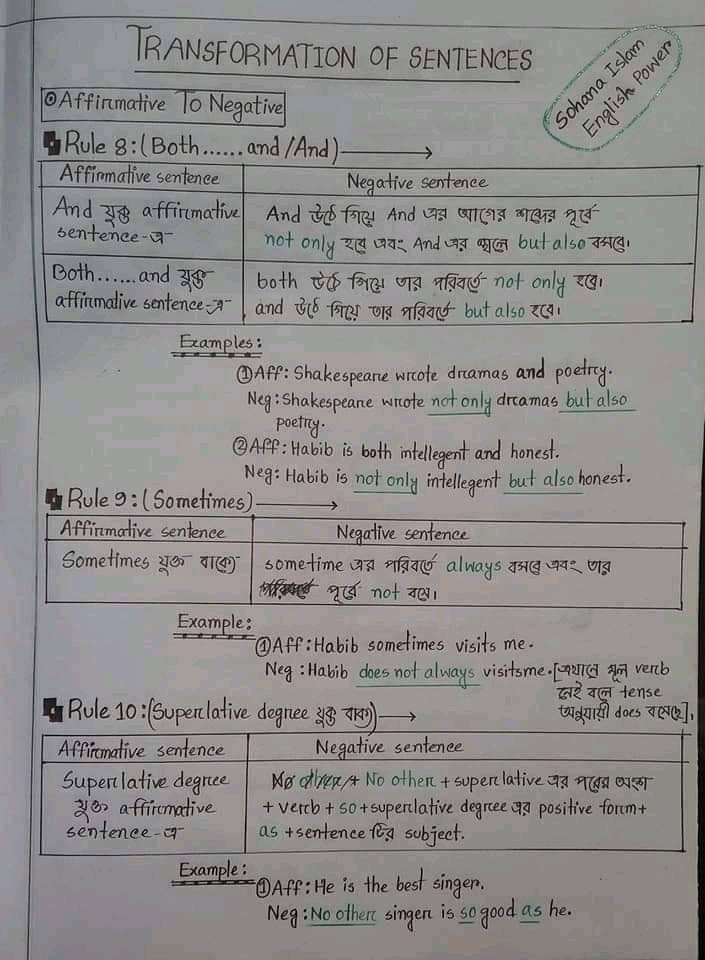
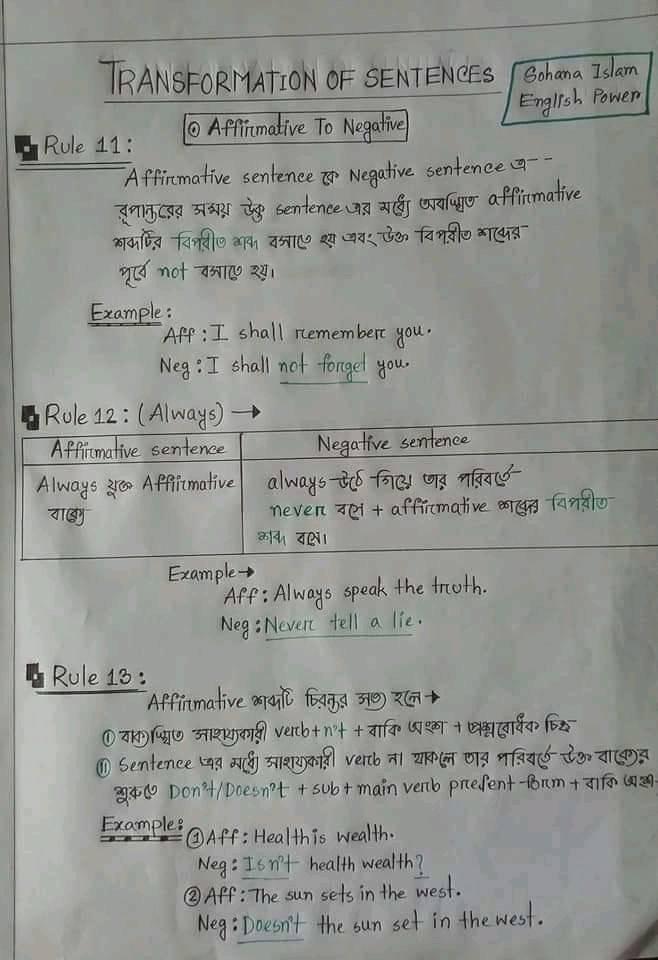
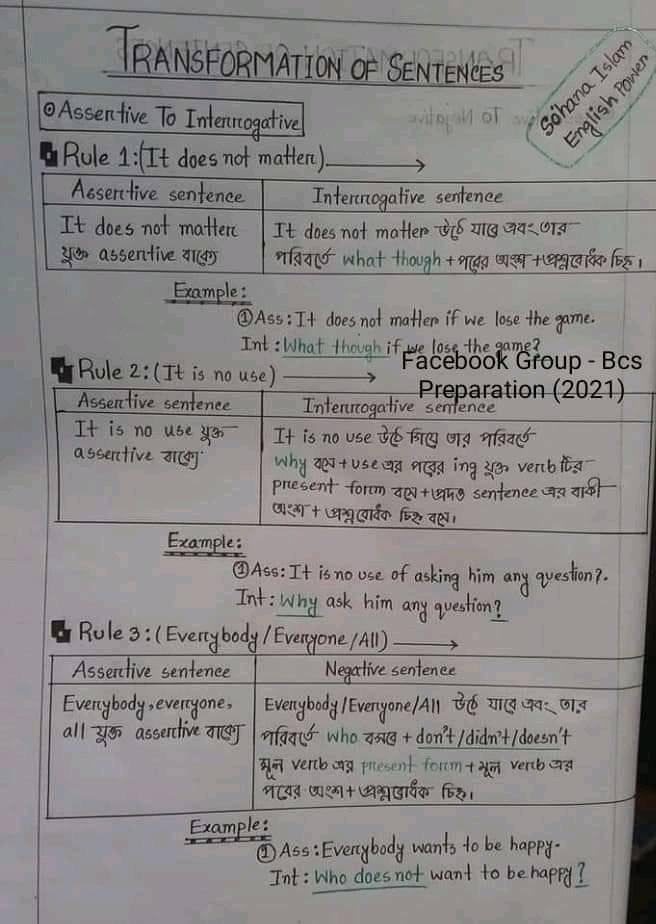
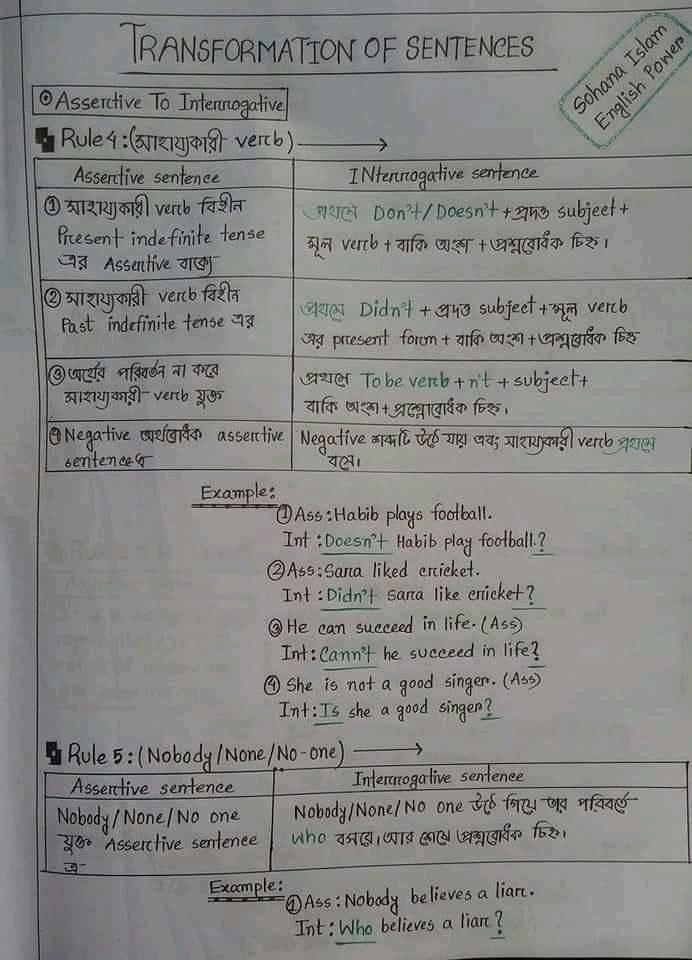
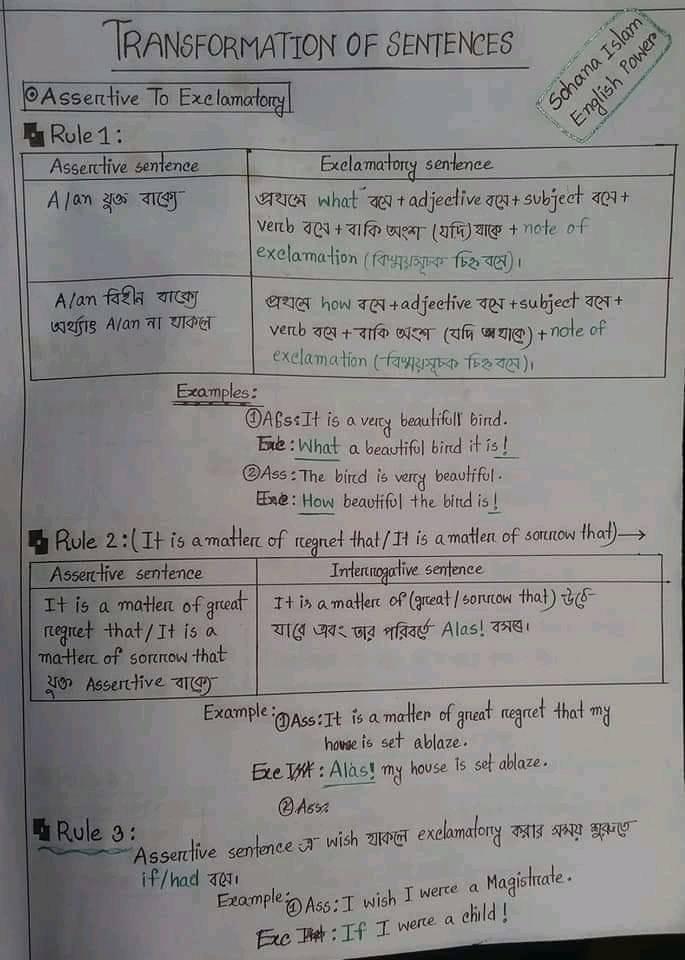
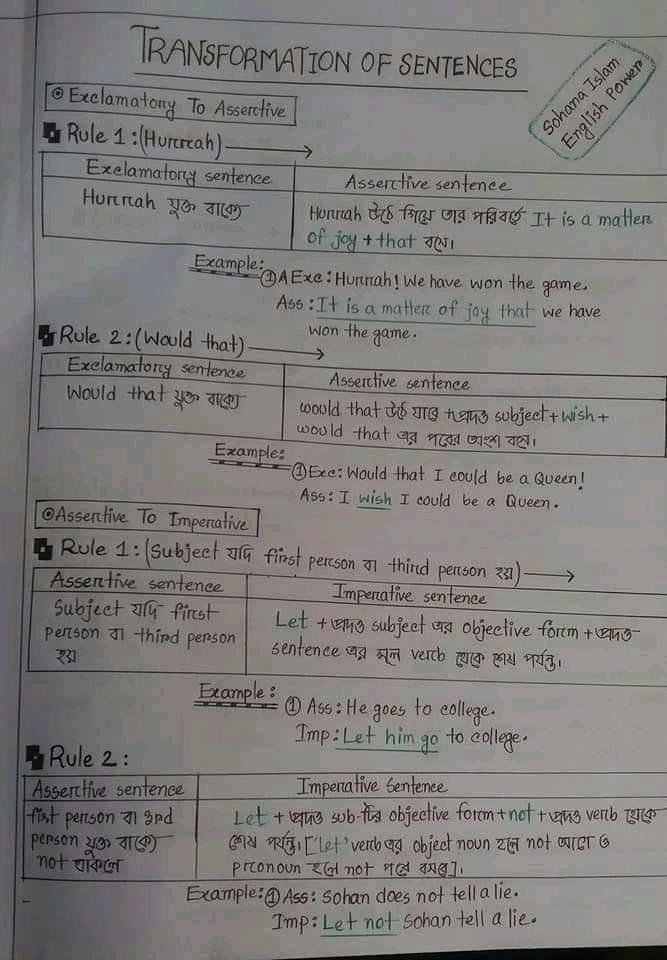
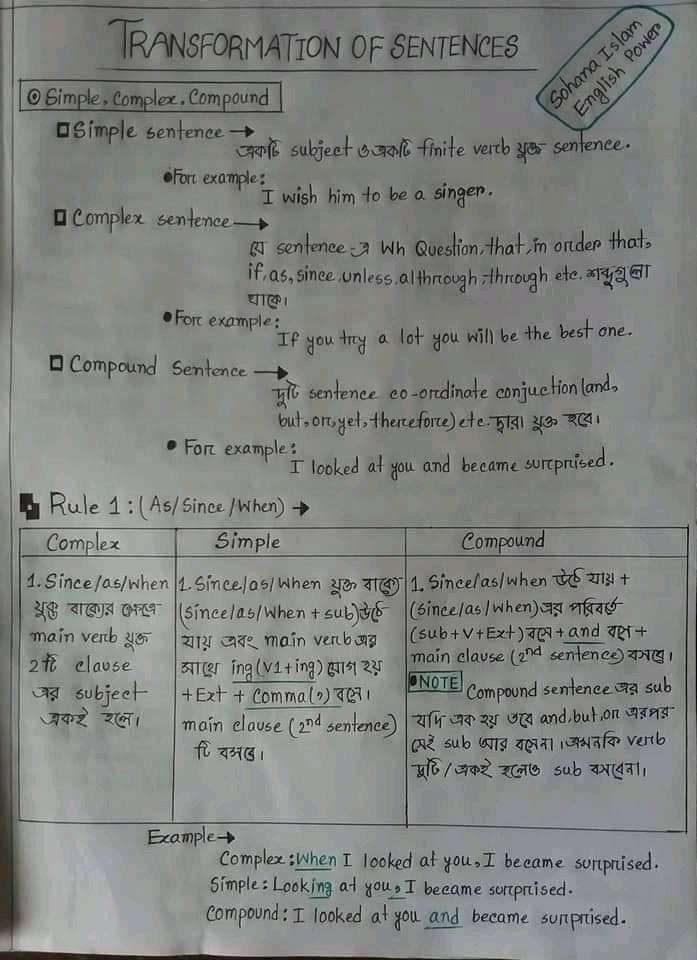
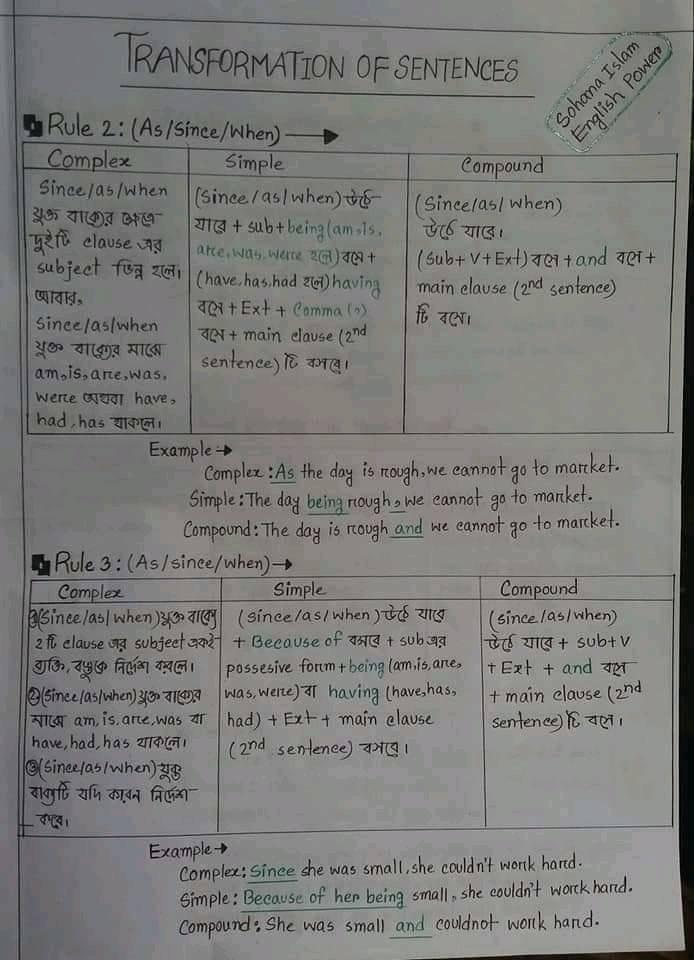
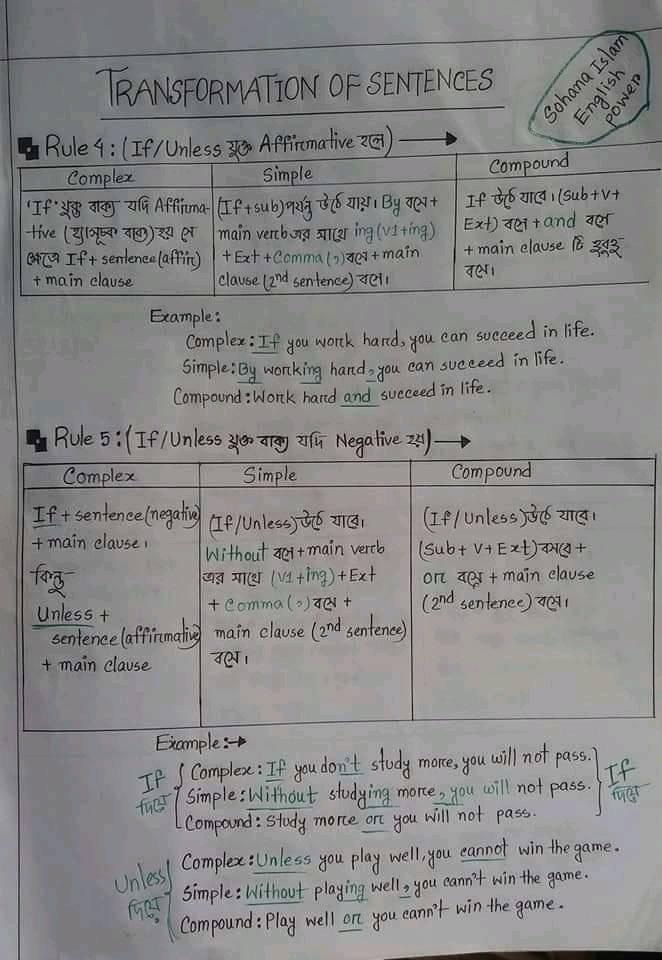
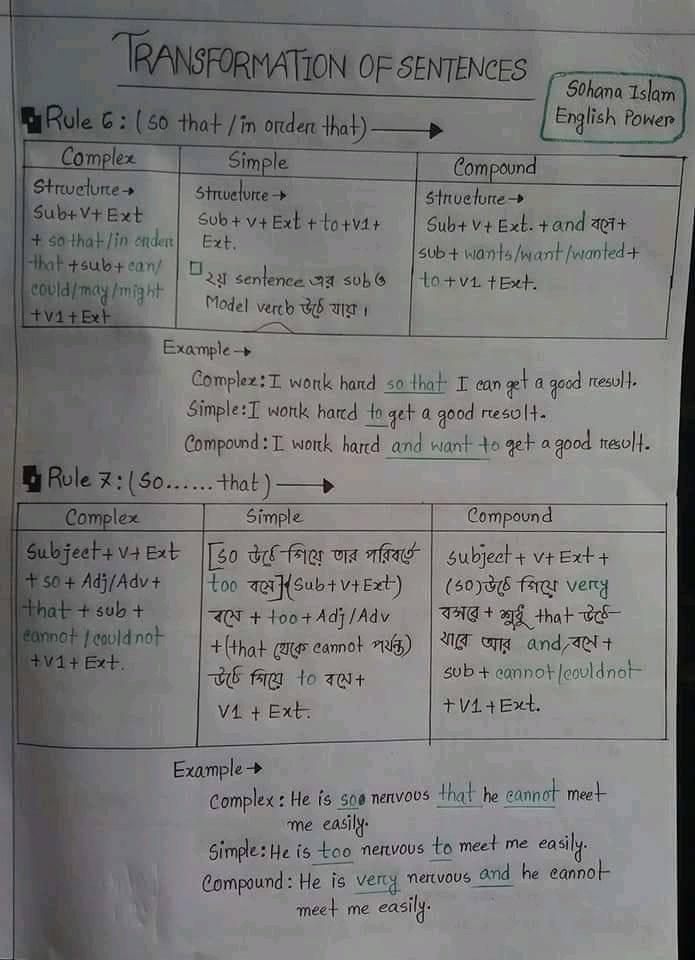
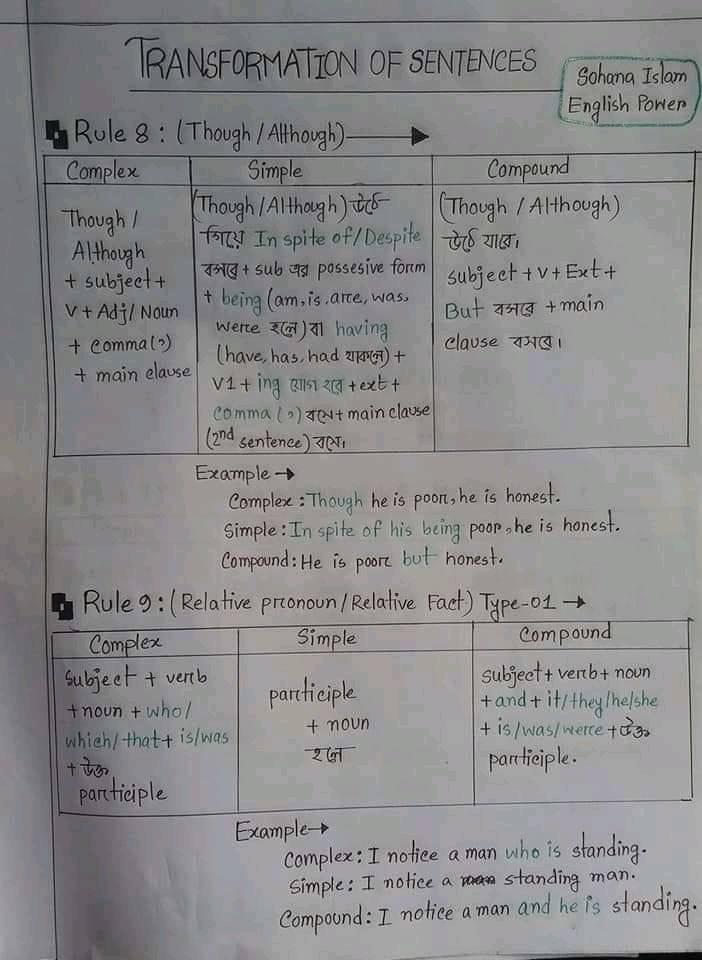
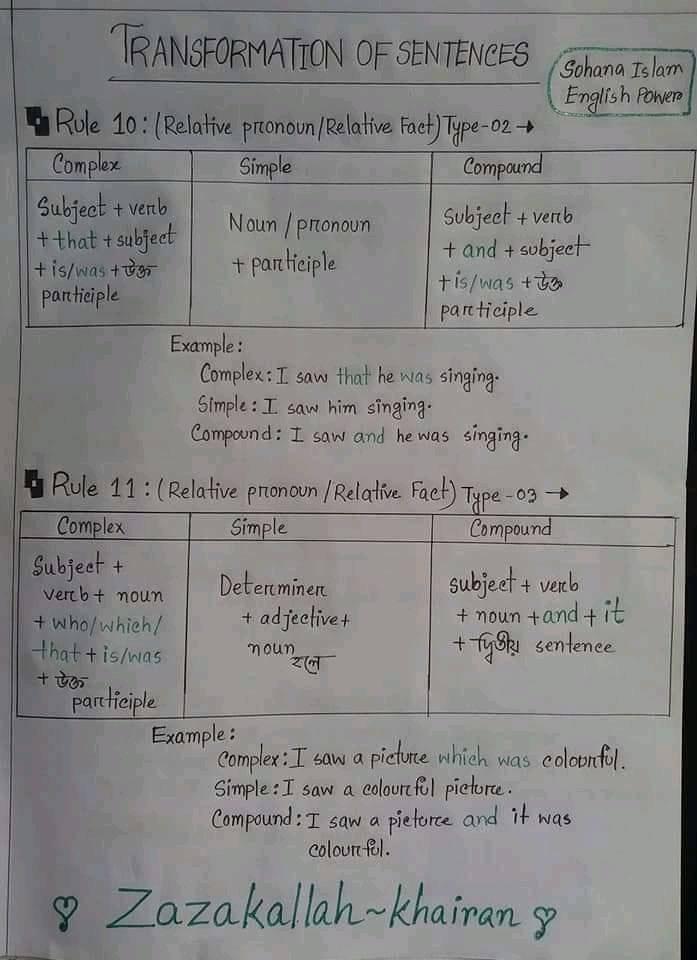
| Header 1 | Header 2 | Header 3 |
|---|---|---|
| Cell 1-1 | Cell 1-2 | Cell 1-3 |
| Cell 2-1 | Cell 2-2 | Cell 2-3 |
| Cell 3-1 | Cell 3-2 | Cell 3-3 |
| Header 1 | Header 2 | Header 3 |
| Cell 1-1 | Cell 1-2 | Cell 1-3 |
| Cell 2-1 | Cell 2-2 | Cell 2-3 |
| Cell 3-1 | Cell 3-2 | Cell 3-3 |
| Header 1 | Header 2 | Header 3 |
| Cell 1-1 | Cell 1-2 | Cell 1-3 |
| Cell 2-1 | Cell 2-2 | Cell 2-3 |
| Cell 3-1 | Cell 3-2 | Cell 3-3 |
